A Brief History of the Rossana / Brandon 2023 Campaign
28 Minute Read
by Ken Barrios
Introduction
Chicago’s 2023 municipal election would be its first since the 2020 Uprising. How would this impact a former teacher and labor organizer, turned Cook County Commissioner, who would throw his hat into the mayor’s race? How would it impact the small but mighty group of six socialists who had won City Council seats in 2019 and would now seek re-election? With left-wing candidates like India Walton losing Buffalo’s mayor’s race in 2021, and right-wing candidates like Eric Adams becoming mayor of New York City, it wasn’t clear what was in store for Chicago.
As a member and precinct captain for 33rd Ward Working Families (33WF), I witnessed the election from campaign planning meetings over Zoom to talking to my neighbors at their doors. The following is a brief history of the Rossana and Brandon 2023 municipal campaigns based on that participation.
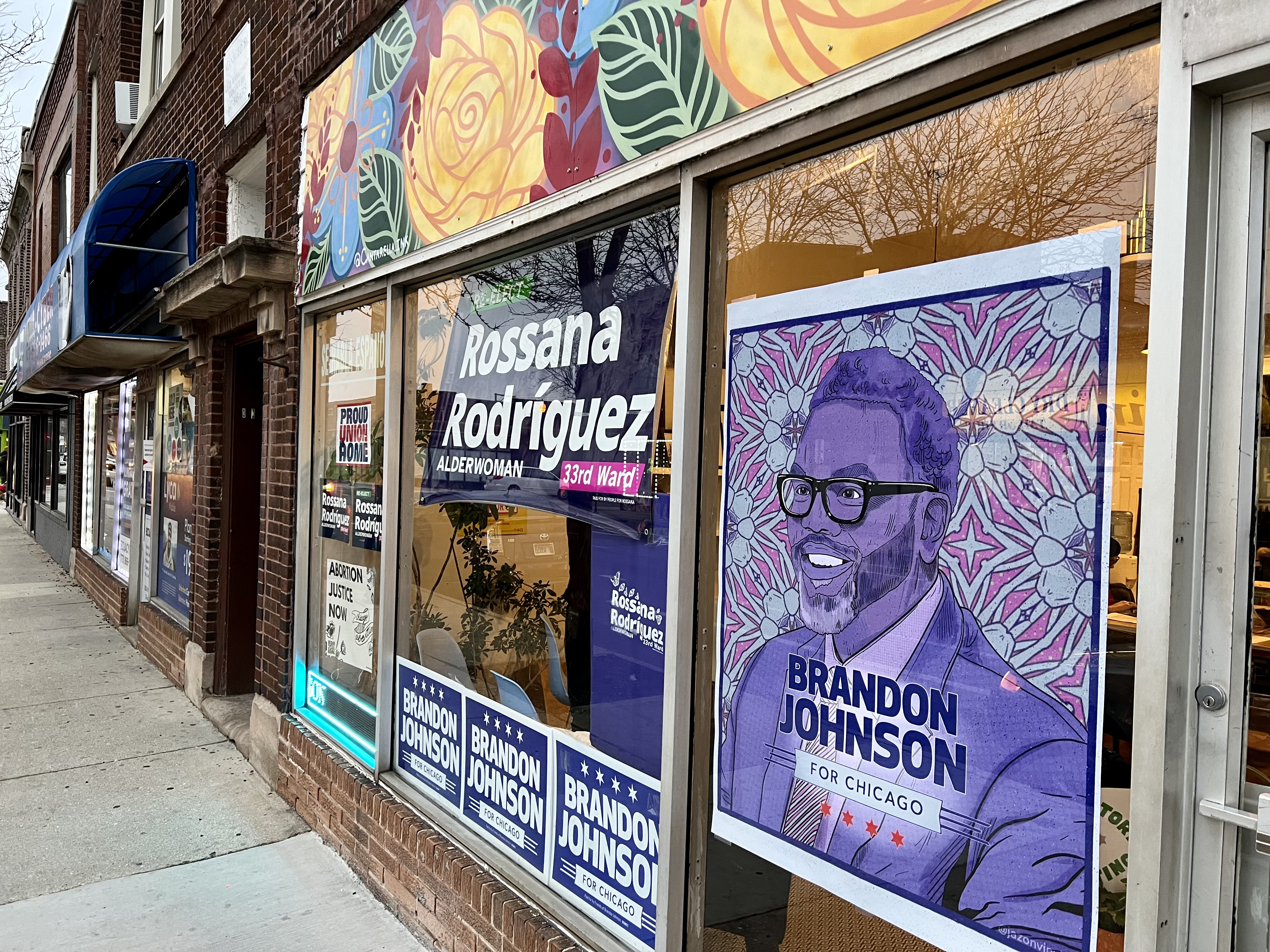
33WF office with Rossana and Brandon signs
The hope is that this text might be useful for other organizers interested in electoral politics and that it might encourage others with additional, or alternate, perspectives to write about them as well. This is not intended to be the final word. It is just one perspective from a struggle that required Chicago’s entire political ecosystem and, as Barbara Ransby stated, “the kind of relentless grassroots organizing you simply cannot buy.”
Special thanks to Kate Barthelme and Caitlin Brady for important feedback and insights.
Thin Blue Line in The Sand
To understand the politics of Chicago’s 2023 municipal elections, it is important to remember how the political terrain was fundamentally changed in 2020. According to the New York Times, the 2020 Uprising had been “the largest movement in US history”. The revolt was triggered by the police murder of George Floyd and lasted roughly from the end of May to the middle of August 2020. Much like Occupy drew a line in the sand between the 99% and the 1%, the uprising drew a line between the anti-racists and police supporters.
This line in the sand manifested in the mainstreaming of abolitionist politics. Suddenly, everyday liberals were questioning the legitimacy of the police. At the same time, radicals were adopting the label of “abolitionist”, initiating campaigns to defund the police, and devouring writings by Mariame Kaba, Ruth Wilson Gilmore, and Angela Davis.
The power of the uprising can not be understated. According to the New York Times, by July 3 between 15-26 million people participated in protests for George Floyd. These were protests where people knew that they were risking COVID-19 infection and police violence. Nevertheless, they relentlessly hit the streets for nearly three months. For millions of participants in the protests, and millions more sympathetic spectators, some degree of opposition to the police joined the list of baseline progressive positions alongside support for reproductive rights, LGBTQ rights, etc.
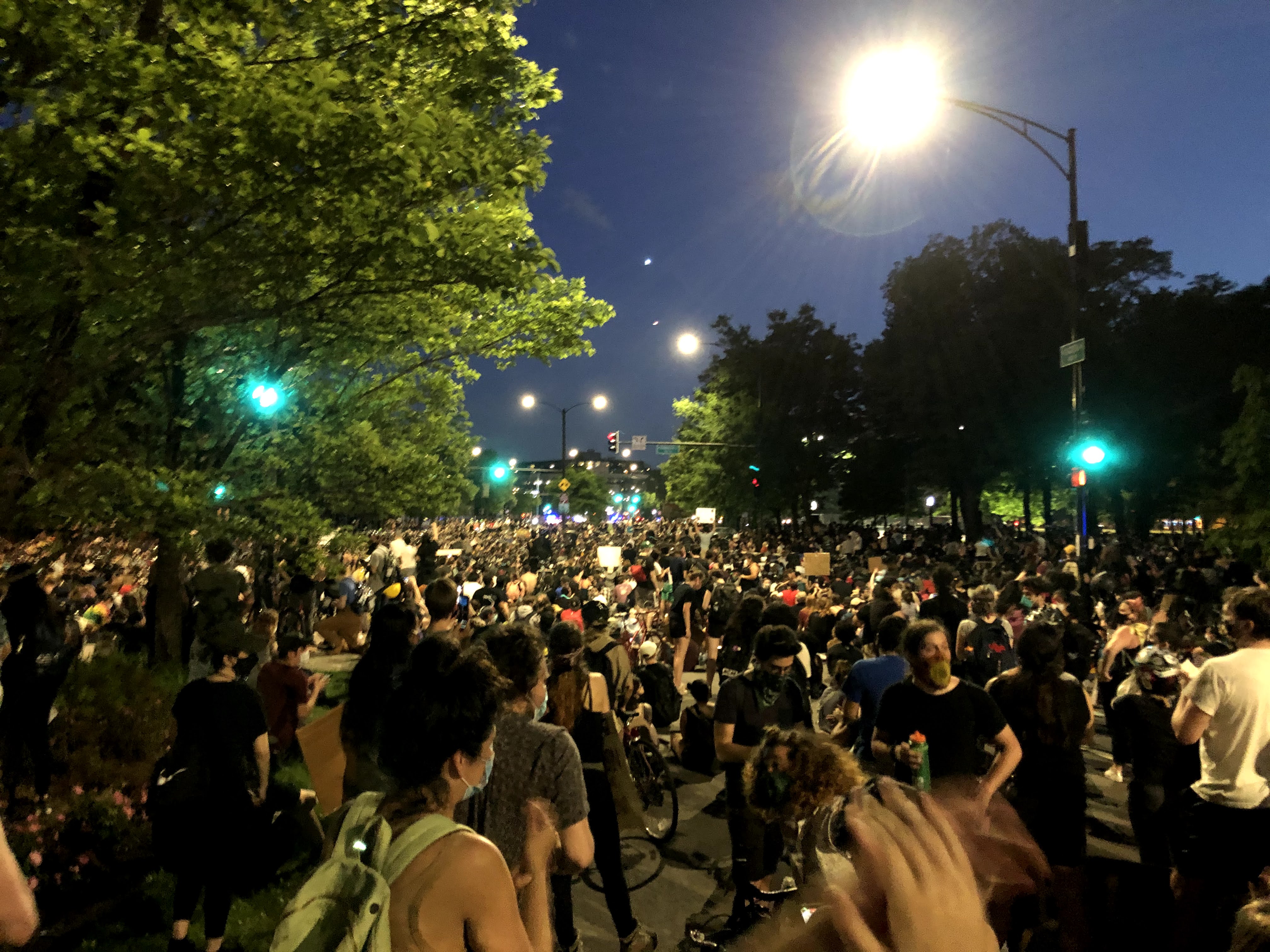
Defund CPD Protestors in Chicago on June 5, 2020
It also manifested in a right-wing reaction that gradually developed over the next few years and was represented by the “Thin Blue Line” movement, the Jan 6 Capitol Riot, and the constant drumbeat of crime paranoia in mass media. While this backlash was primarily associated with the Republican party, Democrats fed into the reaction with Joe Biden’s proposed $32 billion for police in the lead-up to the 2022 primaries.
The bi-partisan backlash threw into question the sustainability of Chicago’s 2019 progressive and socialist electoral victories.
Barometers - June 2022 Primary
This was the tense context as 33WF prepared to campaign in April for Delia Ramirez for Congress and Democratic State Central Committee, Cristina Pacione-Zayas for IL State Senate, and Anthony Quezada for Cook County Commissioner in the June 2022 elections. Delia in particular would be facing off against two major figures on the “law and order” wing of the Democratic Party: Gil Villegas for Congress and Iris Martinez for Democratic State Central Committeeperson.
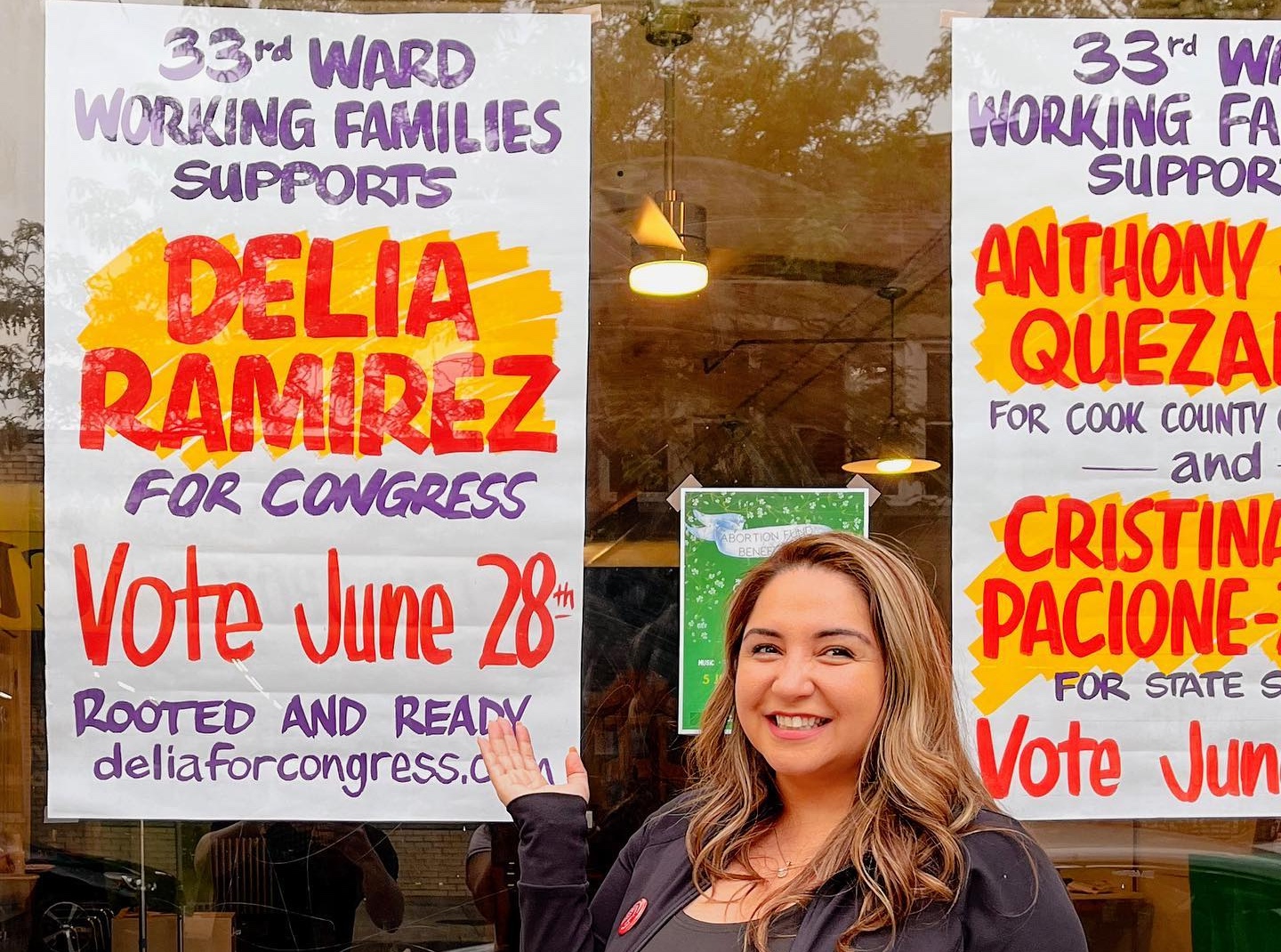
Delia Ramirez pointing to a campaign poster outside the 33WF office
Gil had stated in an interview for WBEZ that, “Unlike my opponent, I’m not going to defund the police. We’re going to fund the police for public safety as our number one job should be.” Iris Martinez doubled down on the law-and-order position by inviting pro-Trump and pro-Jan 6 Chicago police union president John Catanzara to her campaign fundraiser.
Additionally, our ward organization had to deal with the fact that we had not been on the doors since Rossana’s election in 2019. Instead, the pandemic and the uprising had turned our attention to meeting the needs of the moment. Between 2020 and 2022 we:
- Turned our office into a food pantry
- Joined the Right to Recovery coalition to pressure city, state, and federal officials to provide the relief working people needed during the pandemic
- Helped organize defund police protests
- Hosted abortion fundraisers in response to the overturning of Roe vs Wade
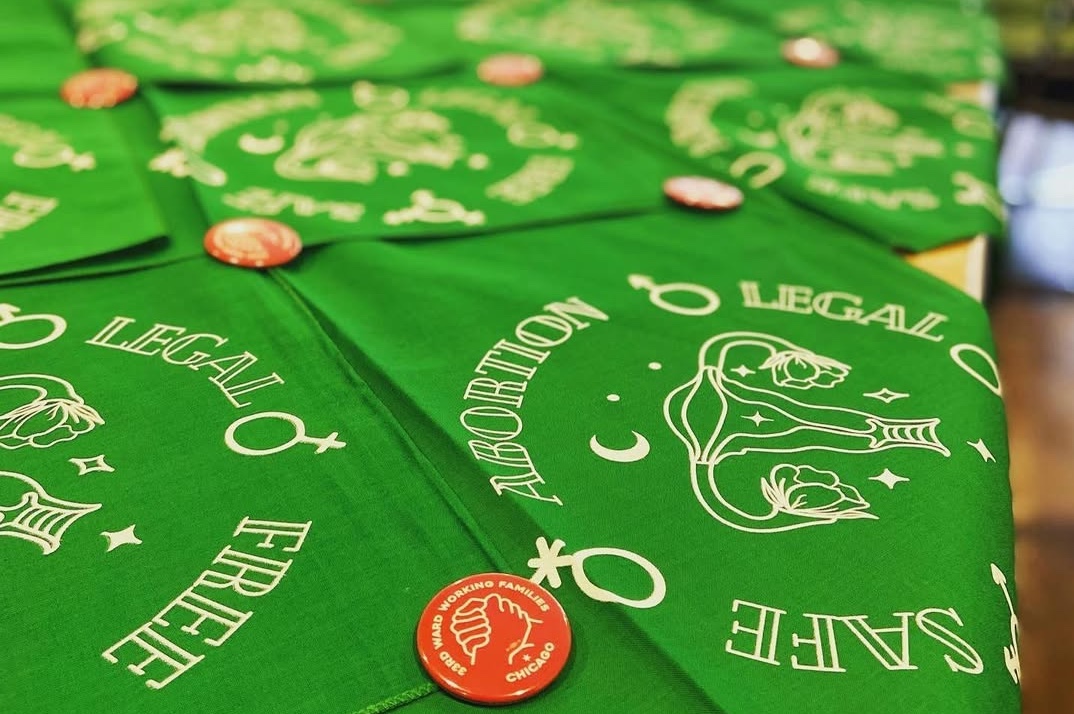
Close up of bandannas sold at 33WF abortion fundraiser
The work we did between elections was essential because it allowed us to learn new skills and continue building community. However, being away from the doors for so long did pose three problems:
- We were going into the election without a sense of the political mood of the ward’s residents
- Our precinct captains program, which was so decisive in securing Rossana’s victory, had dissolved
- Our members needed to rebuild their “canvassing muscles in the gym of the streets”
The absence of the precinct captains was particularly hard because all campaigns require time to build momentum and attract volunteers. In the interim, precinct captains act as “the marines” of a campaign: first ones in, last ones out. They keep social media full of canvassing photos, train new volunteers as they come in, build the foundation of petition signatures, and start winning over voters early in the campaign while receiving initial feedback about how people are responding on the doors. Without them to lead the way, it was difficult to build momentum and get a large and consistent canvassing turnout in the lead-up to the June election.
Despite these odds, none of our candidates caved to the pressure, none of them walked back the defund positions… and they all won!
US Representative 3rd District - Democrat
- Delia Ramirez: 26,728 votes - 66.99%
- Gil Villegas: 9,534 votes - 23.89%
- Iymen Chehade: 2,234 votes - 5.60%
- Juan Aguirre: 1,405 votes - 3.52%
State Central Committeeperson 3rd District - Democrat
- Delia Ramirez: 20,887 votes - 55.07%
- Iris Martinez: 12,494 votes - 32.94%
- Jacqueline Baez: 4549 votes - 11.99%
Cook County Commissioner 8th District - Democrat
- Anthony Quezada: 8,882 votes - 35%
- Luis Arroyo Jr: 4,902 votes - 19.31%
- Natalie Toro: 4,130 votes - 16.27%
- Rory McHale: 3,890 votes - 15.33%
- Edwin Reyes: 3,576 votes - 14.09%
These were decisive, left-wing wins amidst right-wing backlash.
In other words, despite our difficulty in organizing for the June 2022 election, the political effects of the uprising reshaped the politics of the 33rd ward in a way that favored progressives and hampered politicians more openly aligned with the police.
Treatment Not Trauma Referendum
Despite landslide victories in June, there was still uncertainty about whether this was an aberration or an accurate representation of the political mood and its implications for February 2023. Especially because Rossana had been the most visible politician associated with the Defund movement, appearing in interviews for Rampant Magazine and Midwest Socialist, among others, to champion the Treatment Not Trauma (TNT) ordinance.
The TNT initiative emerged as a direct response to the police murder of George Floyd. The uprising pushed Rossana to research non-police crisis response systems nationwide, including the “Crisis Assistance Helping Out On the Streets” (CAHOOTS) model operating in Oregon. As covered in a blog post by 33WF:
Drawing on her experiences as both a policymaker and an organizer, Ald. Rodríguez Sánchez reached out to the Collaborative for Community Wellness (CCW) to explore innovative solutions based on the CCW’s long-standing advocacy efforts to reopen shuttered mental health clinics in Chicago. By merging these two critical needs, they envisioned the creation of crisis response systems emanating from these reopened centers that would provide timely care and treatment within our communities.
Rossana would introduce TNT to the City Council in September 2020.
During 33WF’s June members meeting, it was reported that CCW was asking us to join them in a push to get TNT on the ballot for the November 2022 elections. Abolitionists would canvass on the South Side’s 6th and 20th wards, while 33WF would work on the Northwest Side. This led to a tense yet honest debate about whether or not we should commit.
Everyone was in favor of TNT. However, there were serious concerns about whether our organization needed to rest before the kickoff for Rossana’s campaign in November. Could we survive adding a summer of canvassing?
Pros:
- Rossana wrote, introduced, and fought for TNT
- It would be weird if it wasn’t on the ballot in 33rd Ward
- We can ID more sympathetic folks
- Initiate and shape the convo on public safety since it will be a major talking point during her campaign
- The first time 33WF experienced a major growth spurt was when we canvassed for the Lift the Ban referendum
Cons:
- We would only have approximately six weeks to collect a minimum of 1,400 signatures, and an ideal of 4,000, by August 8
- We struggled to turnout canvassers from February to June, why should this be any better?
- We might burnout canvassers ahead of needing to get Rossana on the ballot
- We have to put in the extra groundwork to get this passed in November if gets on the ballot
- If the referendum fails, it will look terrible and potentially sink us
- This is a non-binding referendum - is it worth so much energy?
In the end, the speakers won over the majority to commit to getting TNT on the ballot. At that same meeting, we voted to endorse Rossana for her re-election.
The TNT canvasses were some of the easiest we had ever done and people were always overwhelmingly receptive. I remember speaking with several people who were pro-cop and still thought that TNT would be a good idea because it would lighten the load for police.
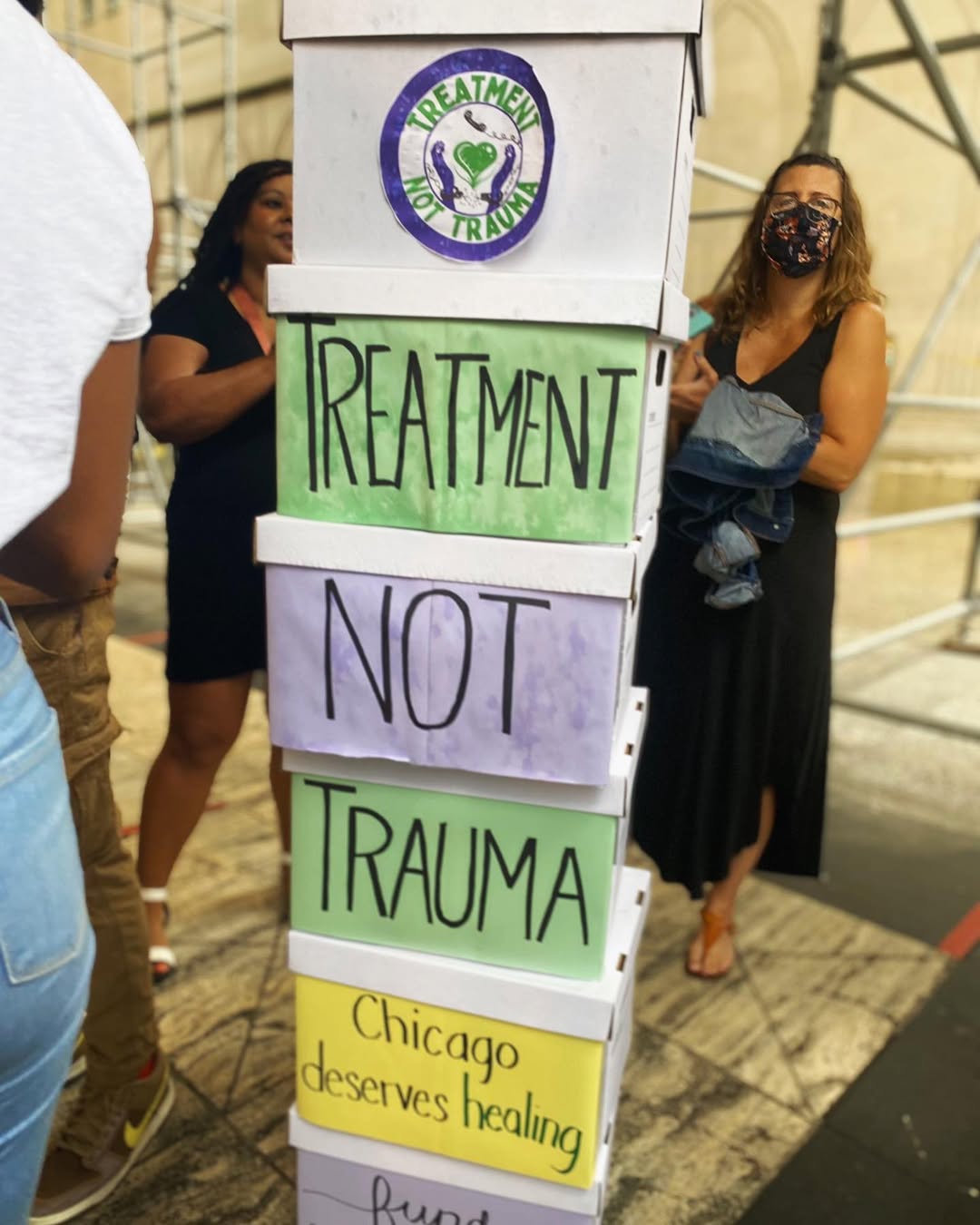
33WF's Jhoanna and Kate standing by TNT signatures collected from across the city
By August 8, we managed to secure +1600 signatures and get TNT on the ballot in the 33rd ward. In canvassing the ward for this referendum, we also helped normalize the idea that there should be non-police response units for emergencies. This political shift would have longer-term benefits for our project.
Barometers - November 2022
33WF went into the November General Election with three candidates for office: Delia, Cristina, and Anthony. But with Chicago being a one-party city, we had no concerns about them losing to their Republican opponents. Therefore, our primary goals for this election were:
- To win a majority “yes” vote for TNT and
- Use Election Day to get registered voters to sign the petition to get Rossana on the ballot for 33rd Ward Alder.
Once again, the backlash against the Uprising was on display. This time it manifested as politicians and mainstream media spreading misinformation and hysteria about the Safe-T Act, which was primarily intended to abolish cash bail. The media and politicians were calling it “the purge act”, as a reference to a 2013 horror film in which there is an annual day of sanctioned lawlessness. We worried that the hysteria had influenced people’s opinions and they might conflate the Safet-T Act with TNT - both of which 33WF supported. Despite this, TNT managed to get +90% “yes” votes in the three wards where organizers got it on the ballot!
Having TNT on the ballot had the added benefit that, as we lobbied people outside polling places to vote for it, we could ask them to sign a petition to get its author on the ballot for re-election. This made our signature collection for Rossana so much easier. The referendum results were an added morale booster for 33WF.
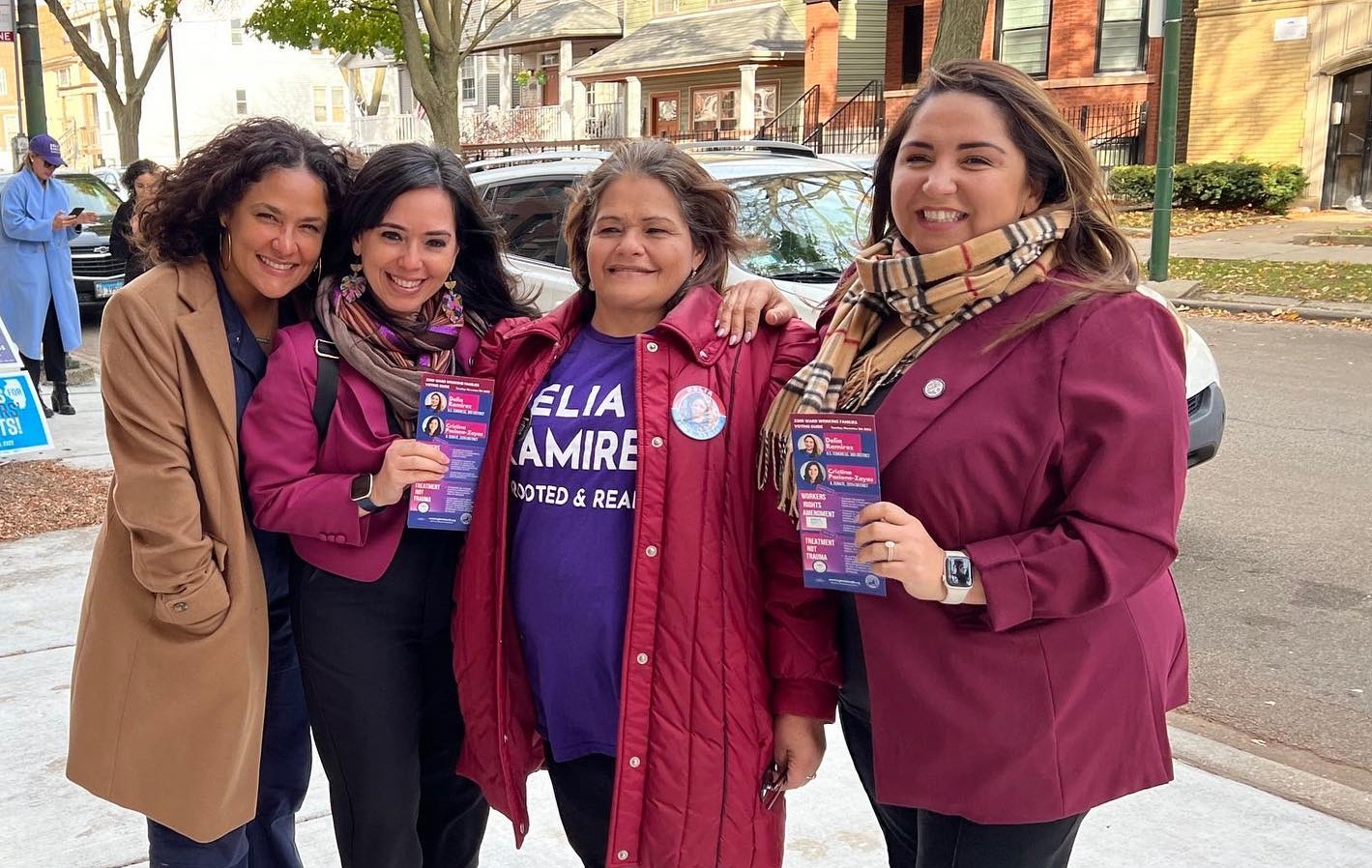
Rossana with CPZ and Delia Ramirez at Patrick Henry Elementary - November 2022
More importantly, this meant that TNT was now major news and a proven talking point for the upcoming mayoral race to distinguish progressive candidates from “law-and-order” candidates. Years of organizing by various organizations across the city for TNT had borne fruit as an unexpected platform for candidates to run on.
An Overview of the 2023 Municipal Races
To understand the 2023 municipal elections, you also need to keep 2019 in mind. The 2019 municipal elections changed Chicago’s political landscape. Six self-proclaimed socialists were elected to Chicago’s 50-seat City Council. This began to erode the long history of the “rubber stamp City Council”. In addition, Lori Lightfoot pulled off a tremendous upset and was elected mayor. As mayor, she wielded the office like a sledgehammer, making enemies among the people who should have been her allies. The lesson from 2019 was that aldermanic seats, and even the mayor’s office, were all up for grabs if you played your cards right.
The absence of a rubber stamp City Council led to some important fights. While Lori is remembered as handling The Pandemic relatively well, the reality is that she faced tremendous fights from Chicago’s left, particularly in the form of the Right to Recovery coalition which pushed her, as well as State and Federal politicians, to provide the assistance people needed. This period also led to UWF helping lead a city budget fight that nearly made history by blocking Lori’s budget in November 2020.
As noted by Midwest Socialist, the end of the rubber stamp era led to an unprecedented 15 old-guard alders not seeking re-election. There was blood in the water. While all 6 socialists sought re-election, they were joined by an additional 8 socialists and 7 progressives. All in all, 21 candidates were running as some shade of leftist. There was genuine hope and optimism that Chicago could be at a turning point.
This was exciting but also posed new challenges. Chicago has a large and impressive political ecosystem of unions, ward organizations, socialist groups, etc. But the reality is that it is spread unevenly across the city, with volunteers generally staying closer to home and campaigns largely dependent on the few unions for donations. While the ecosystem was able to assist 6 socialists in 2019, would it have the people power and funds for 21 aldermanic candidates and a mayor’s race? Were we diluting our forces?
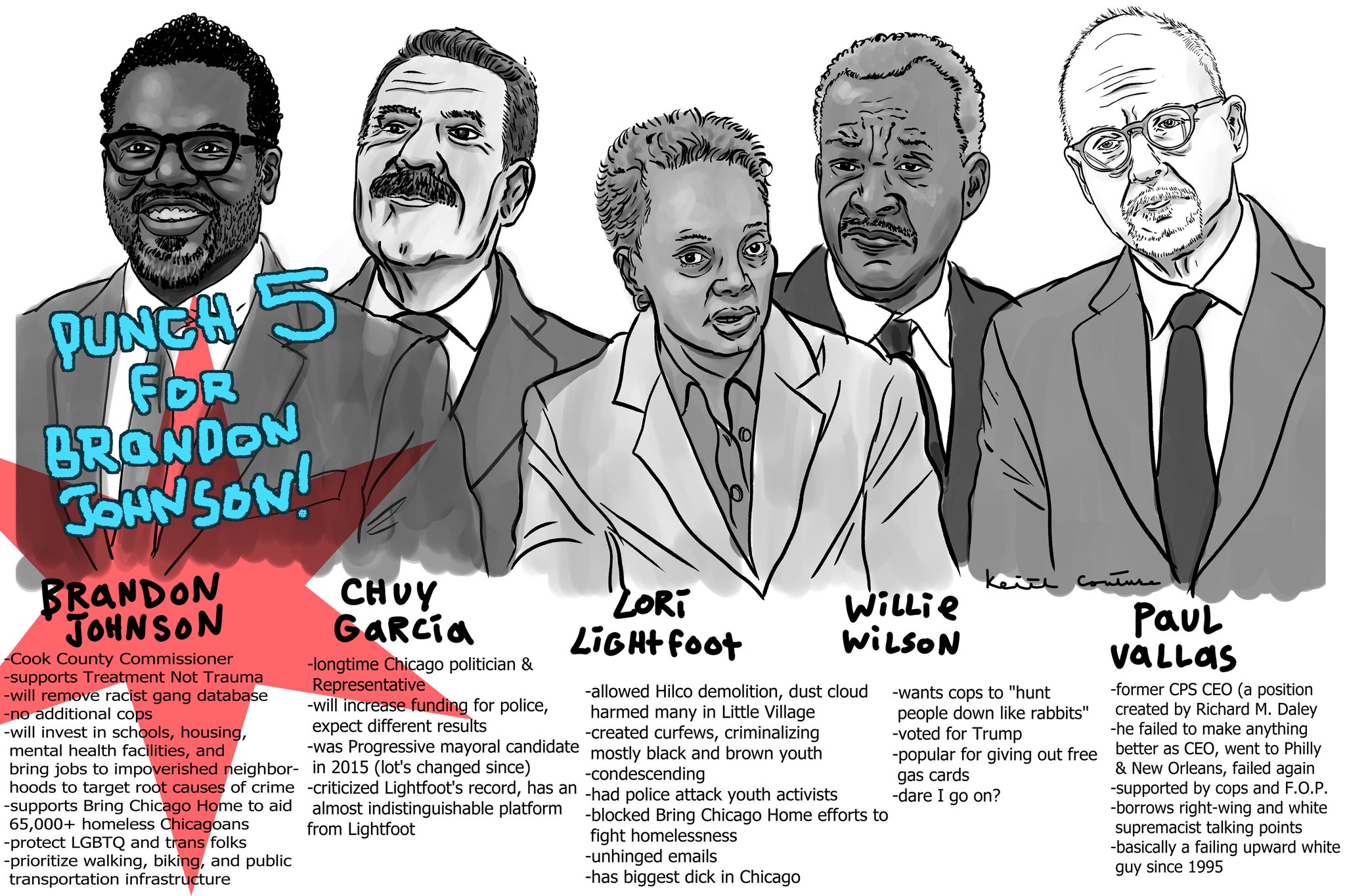
Artist rendition of top mayoral candidates
In any case, the mayor's race was shaping up to be the centerpiece for 2023. Let’s review the main contenders: Lori, Paul, Brandon, and Chuy.
Lori Lightfoot
Before 2019, Lori had mainly operated in the background. But she had gained enough prominence to generate some buzz among progressives in the lead-up to the 2019 mayoral race. She was able to ride a combination of factors into office:
- Mayor Rahm Emanuel was leaving in disgrace after closing 50 public schools and trying to cover up the police murder of Laquan McDonald. For the first time in several generations, there was no obvious Chicago Machine heir for the mayor’s seat, which meant everyone wanted to take a shot.
- Chicago’s longest-serving alderman, Ed Burke, faced a major corruption scandal. As a longtime political fixture, Burke had deep ties to Democratic party members, which meant that most of the people running for mayor could somehow be tied back to him, whether or not they had engaged in any corruption.
- All along, Lori made progressive promises to re-open mental health clinics, support an elected school board, and fight against police brutality. She also staked out the “anti-establishment” position, promising to “bring in the light” against machine corruption.
Lori would go on to win with an astounding 73.7% of the vote. The era of guaranteed Chicago Machine victories and lifetime mayors was over. From now on: the mayor’s race would be anyone’s game.
During her time as mayor, Lori broke her campaign promises. She would also preside over the COVID pandemic and subsequent Uprising. While people debate her handling of the pandemic, her raising of the downtown bridges during the George Floyd protests became a lasting representation of her administration.
Taking an adversarial position towards everyone and everything for four years, she would end up alienating herself to the point that the 2023 mayoral race would definitely be anyone’s game. As documented by Gregory Pratt in “The City Is Up For Grabs”, one of Lori’s aides would summarize the lesson: “You can’t run on a platform and then completely abandon it. You can’t run against the status quo, and then fill your administration with the status quo.”
Paul Vallas
On June 1, 2022, Paul Vallas announced his bid for mayor. If the Uprising polarized on police and public safety, Vallas embodied the right-wing polarization. He was the only white candidate to run for mayor and the most pro-cop, winning the endorsement of Chicago’s Fraternal Order of Police. As reported by Jacobin Magazine, he “made tackling crime the centerpiece of his mayoral run”, promising to hire, “1,200 more cops, in a city where 40 percent of the budget is already earmarked for policing”.
Vallas had a track record of destruction. As noted by The Triibe, from Chicago to Philadelphia, and beyond, Vallas had a history of taking unelected positions that destroyed public education around the country. He began that career when he was appointed the first CEO of Chicago Public Schools in 1995. To add insult to injury, one of the positions Vallas campaigned on was to fix the CPS deficits. This was infuriating since, as tracked by the Action Center on Race and The Economy, it was Vallas himself who began skipping the union pension payments and taking on “the school district equivalent of a payday loan” that created the deficit in the first place!
Anecdotally, one of my first political memories was learning about Paul Vallas because I overheard my McPherson Elementary school teachers talking about him in the 90s. They feared what he was going to do to our education and his name stuck with me because he became a boogeyman. Now, that boogeyman was back.
Vallas was the right-wing candidate to beat.
Brandon Johnson
Brandon Johnson, a former Chicago Public Schools (CPS) teacher and Chicago Teachers Union (CTU) organizer, became a Cook County Commissioner in 2018. As Commissioner, he fought to pass the Budget for Black Lives. Over the summer of 2022, word began to spread that he was considering running for mayor. The success of UWF candidates in 2019, coupled with the success of the TNT referendum, and the unexpected victory of Lori Lightfoot in 2019 pointed to an opportunity for Chicago’s Left to take the mayor’s seat.
If the mayoralty was “anybody’s game”, then who was to say that our dedicated ground game couldn’t win this executive office? There was a sense that this was our chance and we might never get it again.
Over the summer, Brandon met with various grassroots organizations to introduce himself and presumably find out what kind of support he could count on.
This spurred ward organizations from the Northwest Side to team up to host the Northwest Side Progressive Mayoral Forum on Sept 21st. It was hosted by: 30th United, 33WF, United Neighbors of the 35th Ward, 39th Ward Neighbors United, and United Northwest Side. The candidates were Kam Buckner, Ja'Mal Green, and Brandon Johnson.
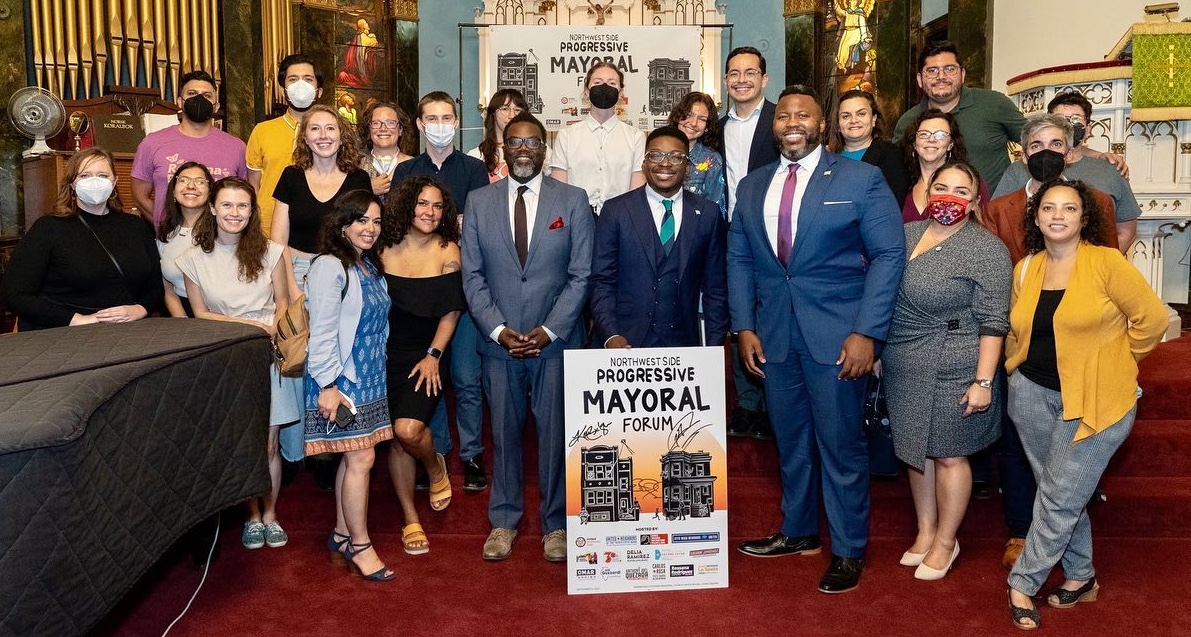
Participants and volunteers from the NWS Progressive Mayoral Forum
The forum gave our organizations a chance to: introduce the candidates to a wider community, set the terms of debate, raise our profile within Chicago’s political ecosystem, model what party democracy could look like, and work on something concrete together.
UWF hosted its 2022 Members Convention across September 23 and 24 where the members voted to endorse Brandon Johnson for mayor, even though he had still not committed to run. 33WF is an affiliate of UWF and our members participated in the debate and voting.
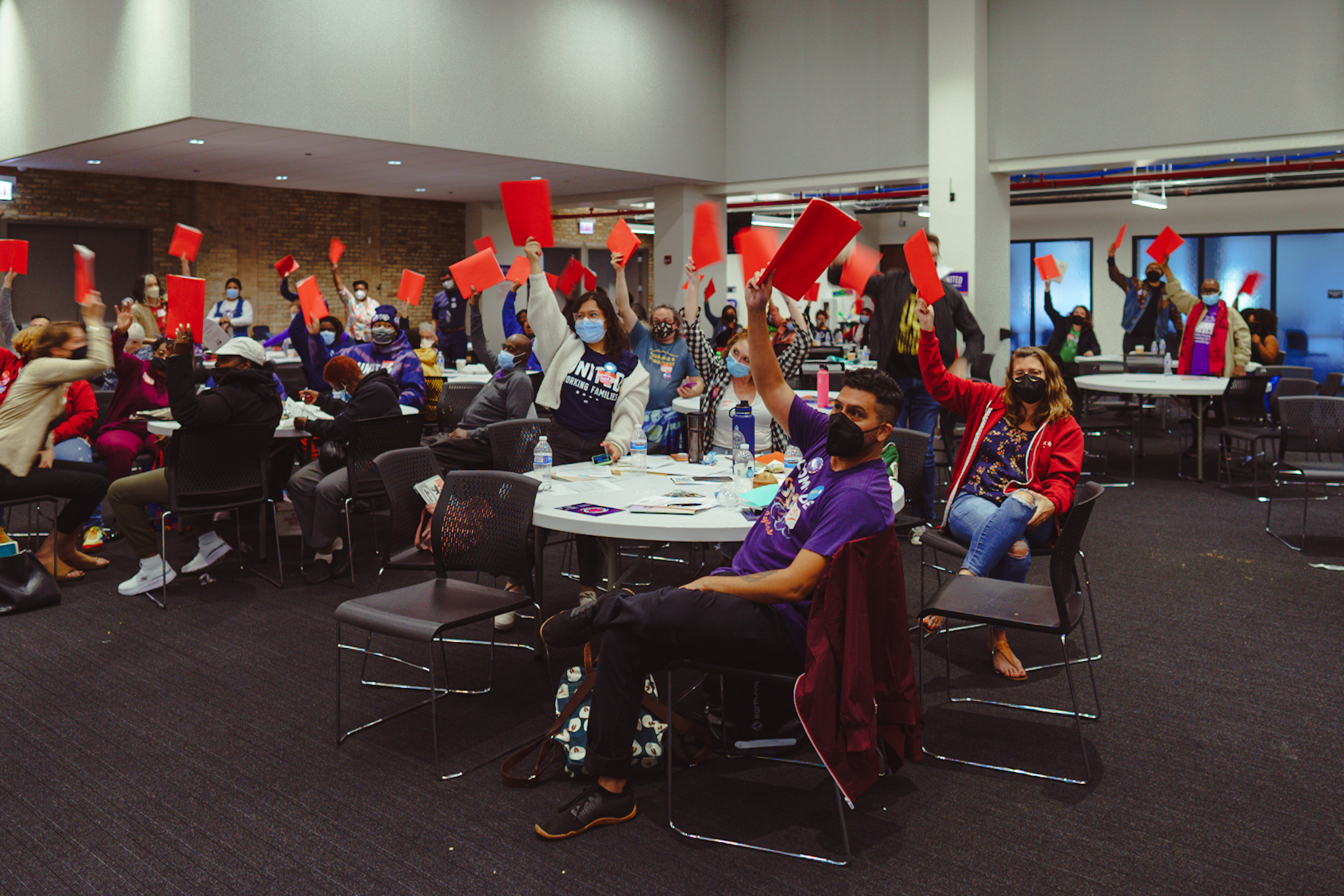
UWF members voting at the UWF 2022 Members Convention
Some of our members expressed concerns about engaging in the mayoral race. Earlier, after Brandon held a special Q&A with 33WF, one member summarized our conflicted position: “I want to want to endorse him.” There was an awareness that if Brandon won, we would be heading into uncharted territory: a left-wing politician taking an executive office.
So far, our experience was of having our comrades take aldermanic seats. Because we weren’t in the executive seat, we were able to punch up at the mayor while the responsibility of being the boss of the city remained on the mayor’s shoulders. But if we won, now our candidate would be the boss, a boss who ran the police and would probably have to push austerity. Now the responsibility would be on “our person”. This created a tremendous sense of hesitation.
But the reality was that there was a palpable excitement growing around Brandon and we got swept up in it. There was reason to be excited! Brandon had been a strike organizer for CTU in 2013. He had been a hunger striker for Dyett High School in 2016. There was a grounded reason to think he would be a “labor leader in office”. On Sept 29th, Brandon was endorsed by the CTU.
With UWF and CTU giving Brandon early endorsements, the excitement around him exploded. These endorsements represented the culmination of UWF and CTU’s aspirations to take the mayor’s office since battling Rahm Emanuel’s school closures in 2013. It was also an acknowledgment that Brandon only had 3% name recognition, and would need the entire political ecosystem to unite behind him to win.
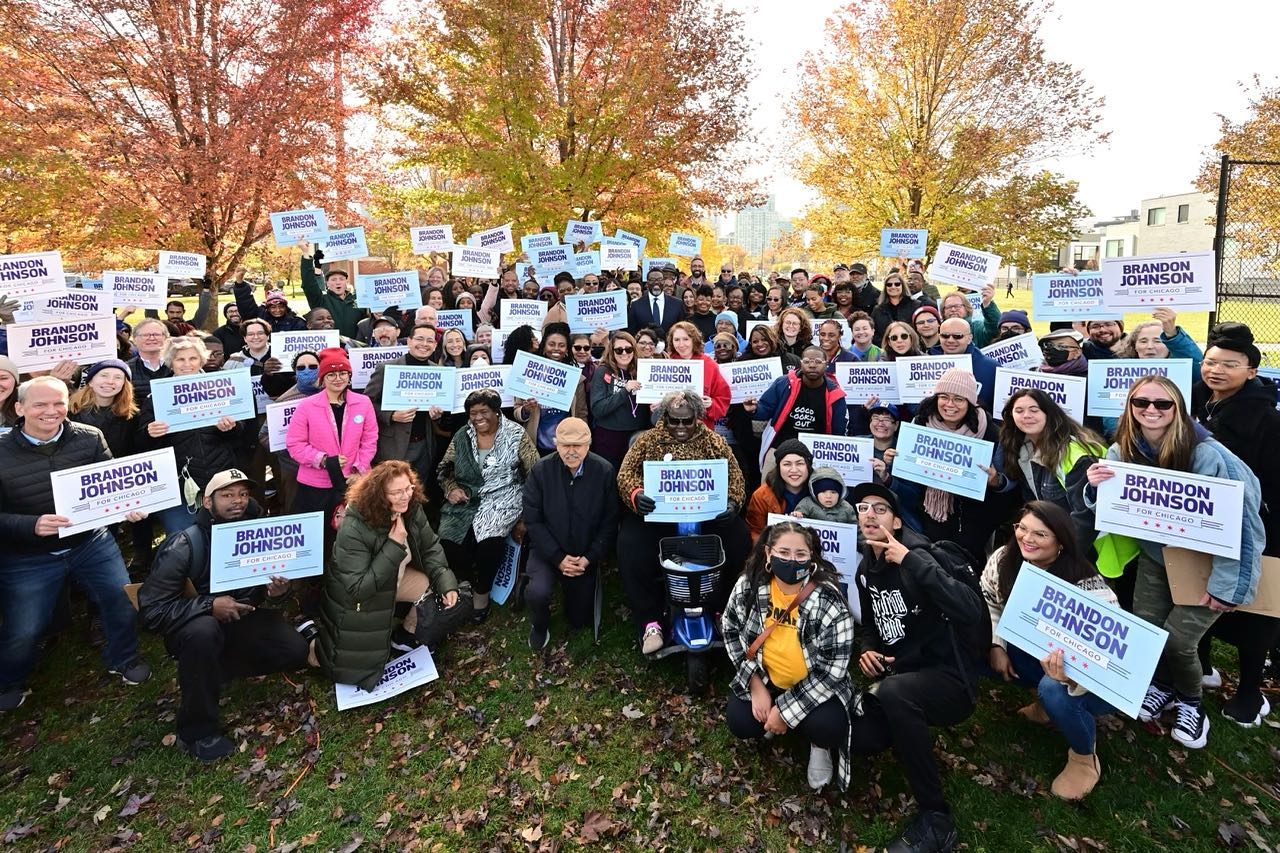
Brandon announces his candidacy flanked by tons of supporters
With these major endorsements under his belt, Brandon officially announced his candidacy on October 22 at Seward Park, flanked by tons of supporting politicians and organizations from around the city. During his speech, the very first policy he mentioned was Rossana’s TNT, aligning himself with the organizers who had been pushing to take money from the police and use it for actual public health and safety policies.
Jesus “Chuy” Garcia
On November 10, Jesus “Chuy” Garcia announced his mayoral candidacy. This was a genuinely stressful moment. While most left-wing groups were lining up to endorse Brandon, the reality was that Chuy had much higher name recognition among everyday Chicagoans. His political roots stretched back to the days of Chicago’s iconic progressive mayor, Harold Washington. He had even run against Rahm in 2015. On election day, there was a high likelihood that the average Chicago progressive would see his name on the ballot and choose him, effectively splitting the progressive vote.
But once again, the Uprising changed everything. His campaign failed to understand that the line in the sand was now about police. To distinguish himself from other candidates, and to mobilize the volunteer energy of progressives, he was going to have to build a platform that pivoted away from policing and more toward programs like TNT. Instead, he resurrected his position from 2015 “to hire 1000 additional Chicago police officers”. In this new climate, that position was not going to inspire the volunteer energy of Chicago progressives. Nor would it win him support from conservatives. Why would they support Chuy when Vallas had the backing of the FOP?
Chuy’s entry into the race meant we would see who performs better: a progressive who is pro-police or a progressive who is pro-TNT?
33WF Gears Up
We went into this municipal election on a different footing than 2019. For Rossana’s first campaign, we spent the spring and summer preparing ourselves with canvasser training events, meetings to build the platform, etc. We also collapsed the entire organization into the campaign, meaning that 33WF stopped having members' meetings until after April 2019. This time, we would build off of the inertia of the June and November elections and the infrastructure we had established over the last 4 years.
Kate Barthelme agreed to take on the role of Campaign Manager, building on her experience as Field Director during the 2019 campaign. Caitlin Brady had been the 2019 lead volunteer coordinator and would now co-lead as Field Director with Jesse Connor. Instead of collapsing the organization, we would maintain a “skeleton committee” to keep 33WF functioning, using member meetings to provide campaign updates, and preparing to hit the ground running once the election was over.
In December, 33WF decided to give the team a breather. We’d gone non-stop all year and we would use December to recharge before the marathon of the next four months. However, before taking a break, Kate organized two things. First, we would re-build our precinct captain program. Second, we would need a team of trainers to help bottom-line our canvasses.
While regular canvasses were underway, our precinct captains got into the routine of walking their precincts as often as possible but usually twice a week. Just like any canvass, this was a chance to meet voters and win them over to vote for our candidates. But for precinct captains, this had the added dimension of introducing ourselves as neighbors. We were building relationships with the people who opened their doors because the same captain would be hitting the same doors over and over during the campaign. It would be a familiar face greeting you, giving you campaign updates, and reminding you to vote.
Trainers would help launch canvasses. They would prep the office 30min before a canvass, and greet canvassers with “radical hospitality” to make them feel at home and know they were essential to the project. Trainers would train any new volunteers, provide all volunteers with campaign updates and the turf to walk, as well as prepare and disseminate campaign materials like palm cards and door hangers. When canvassers returned, trainers would welcome them back and debrief the good and the bad of the experience. When done well, the debriefs would be as good, if not better, as expensive polling.
A tough lesson from Rossana’s first campaign was the tremendous toll of having the same 4 people set up every single canvass. “Training the trainers” would allow us to spread out the work to avoid burning out our members.
January 2023
In January, 5 mayoral candidates participated in the People’s Unity Platform, including Brandon Johnson and Paul Vallas. The event was organized by Grassroots Collaborative and various progressive groups from around the city, who had all turned out their members to pack the church where the event was held. Throughout the debate, audience members would boo or cheer responses. At one point in the debate, a euphoria emerged around the topic of TNT, as one candidate after another seemed to try and out-position each other as being in favor. Even Vallas got in on it, demonstrating how much our collective work to fight for TNT had reshaped the mayoral debates, especially for the people deciding who to volunteer for. Among the most energetic and politicized layers of Chicagoans, TNT had become the defining question of who to support.
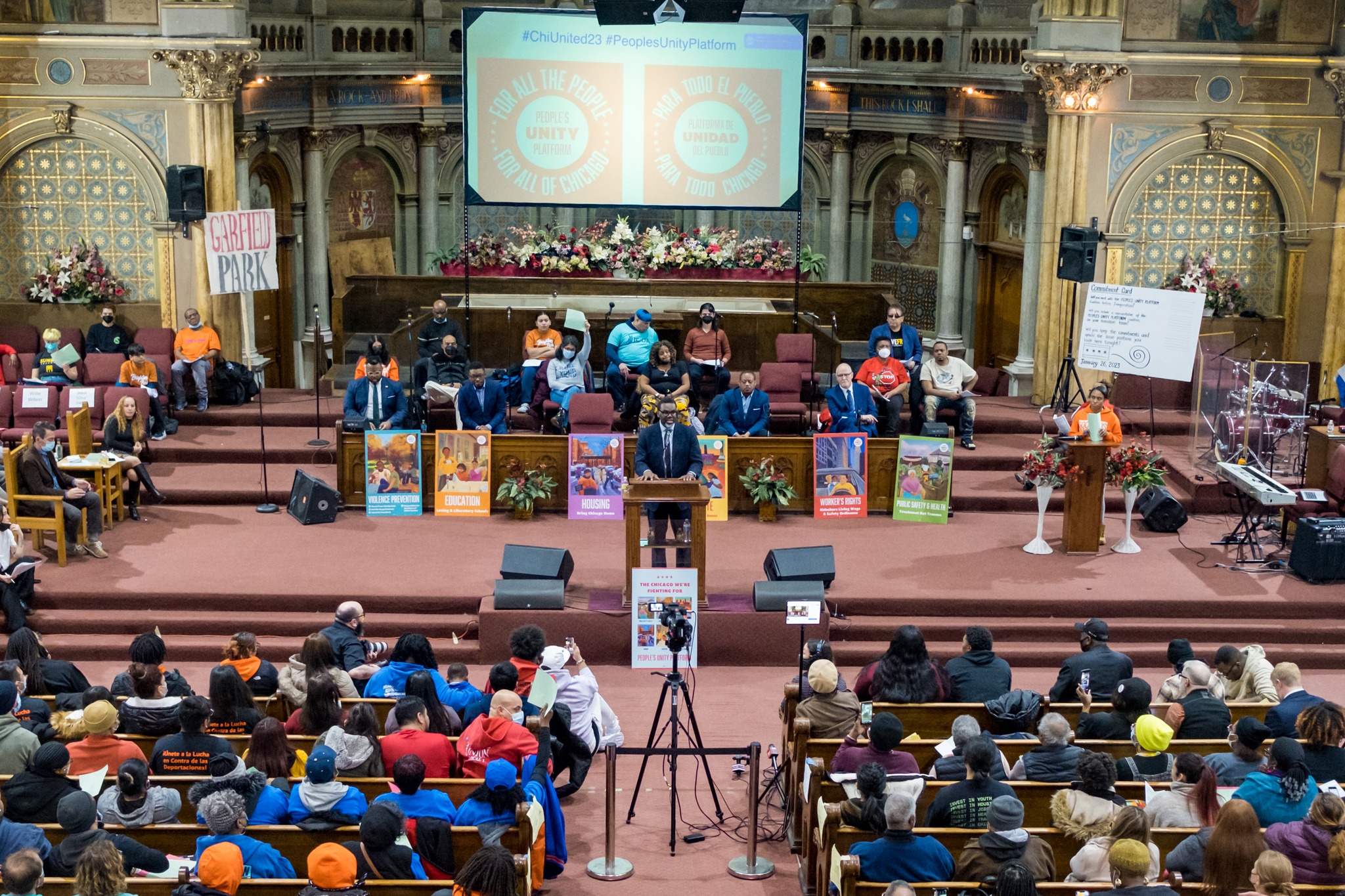
Birds-eye view from the People's Unity Platform event
Rossana Rodríguez Sánchez
While most of the attention was on the mayoral race, we still had an aldermanic seat to defend. So let’s talk about Rossana!
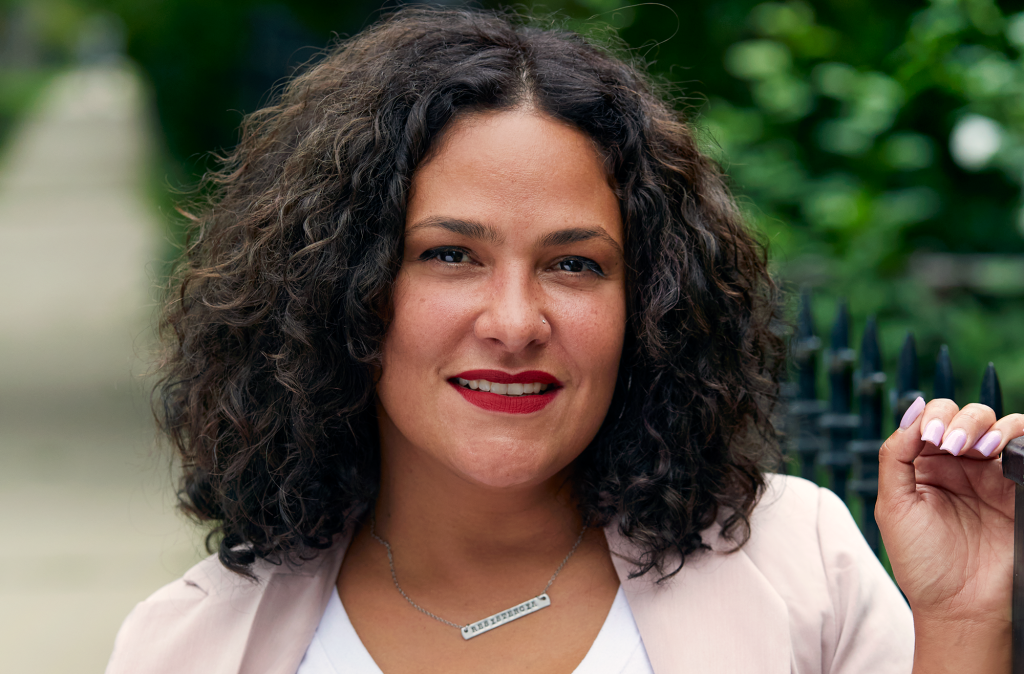
Rossana's re-election campaign photo
As recorded by Micah Uetricht for Jacobin, Rossana is from Humacao, Puerto Rico. She grew up on a “mountain that overlooks the sea” and with a father who was a community organizer. Her first memory of struggle was joining a protest as a six-year-old against a US military base that was diverting water away from her town. The protest movement succeeded, bringing the water back to her community. She called the experience, “a revelation”.
“They took our water, we went and we took it back. Because it belonged to us. So, I learned that early: you need to fight for the things that belong to you.”
From an early age, Rossana was a socialist. She was with the socialists in her community because they were the ones leading the fights for public schools and basketball courts. She was with them in college fighting against privatization and austerity.
Rossana grew up to become a public school theater teacher. While she loved her occupation, the government slashed education budgets and laid off government employees. While looking for work in 2009, she found a job opening in Chicago’s Albany Park Theater Project (APTP).
Rossana and her APTP students would interview people in the community and political organizers to create “plays based on people’s real-life stories”. For “Feast”, a play about the way food shapes our lives, Rossana took her students to interview street vendors, shopkeepers, and a mole-making collective. For “Home/Land”, a play about the struggle of immigrant and undocumented families, she had her students visit immigrant justice marches, vigils, and a deportation center.
Many of her students attended Roosevelt High School, which put her in contact with high school teacher Tim Meegan. She would join his 2015 aldermanic campaign, and then go on to help form 33WF. With 33WF, she would participate in solidarity work with the Albany Park Defense Network and Organized Communities Against Deportation to stop the deportation of our neighbors. She also joined 33WF to challenge former 33rd Ward Alderwoman Deb Mell at “ward nights”. All of this rooted her in the Albany Park community and Chicago’s left-wing organizations.
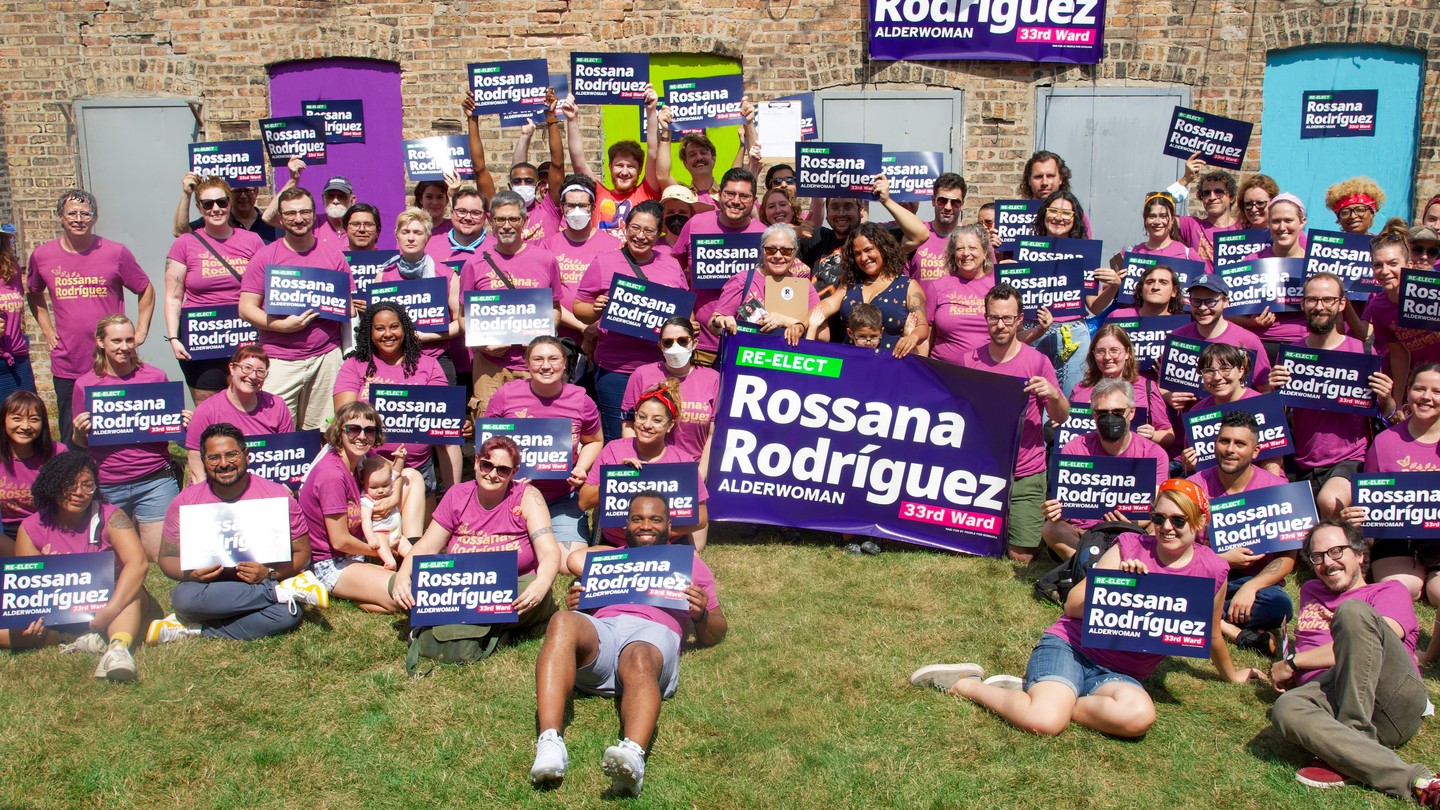
Group photo from Rossana's re-election petition launch
The trust that 33WF had in Rossana led us to push her to run for alderman in the 2019 elections. The campaign built on the pent-up energy from knowing that Tim Meegan had been 17 votes away from run-off and that Bernie Sanders’ 2016 presidential campaign had unleashed excitement for electoral politics among leftists. She would go on to beat Deb Mell in a run-off in April 2019.
During her first four years in office, Rossana implemented important ward-level programs for a more expansive and inclusive democracy. This included programs like Community Driven Zoning and Development (CDZD) and Participatory Budgeting (PB).
Rossana also used her time in office to fight for important political gains. She championed Treatment Not Trauma, fought to ban police collaboration with ICE agents by closing loopholes in the Welcoming City Ordinance, she championed and passed the Bodily Autonomy Ordinance to protect those coming to Chicago for reproductive and gender-affirming care as well as protecting healthcare providers while forbidding the city from sharing info about anyone seeking these services.
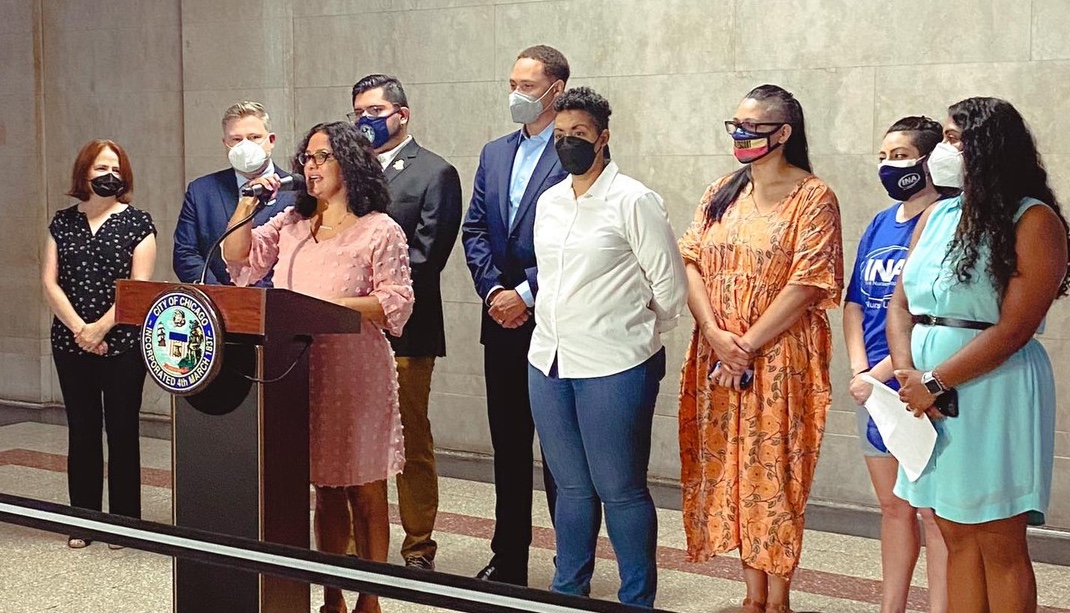
Rossana speaking at press conference for the Bodily Autonomy Ordinance
Beyond her official work as an alder, Rossana still found the time to help with community organizing. Shortly after taking office, she helped organize “bike brigades” to protect our neighbors from Trump’s ICE raids. During the 2020 Uprising, she helped with jail support and worked with the Black Abolitionist Network to help organize a Northside location for political education.
And she did all of this while providing the 6th fastest ward services in the city!
When Rossana ran in 2019, it was on promises. She would run for re-election on her receipts.
Rossana's 2023 campaign video
Samie and Laith
When Rossana won the aldermanic seat in 2019, it was by 13 votes. Between the narrow 2019 victory and the backlash to the Uprising, there was anxiety about how she would perform this time.
Samie Martinez would be our primary adversary, but a curious one. On the one hand, he was a political unknown in the 33rd ward since most of his political life had been as Chief of Staff from 2015 - 2020 for the corrupt former 12th ward alderman George Cardenas. So he didn’t have any community reputation to run on. Worse, he had been part of Cardenas’ team when Cardenas accepted a $10,000 campaign contribution from MAT Asphalt, a corporate polluter.
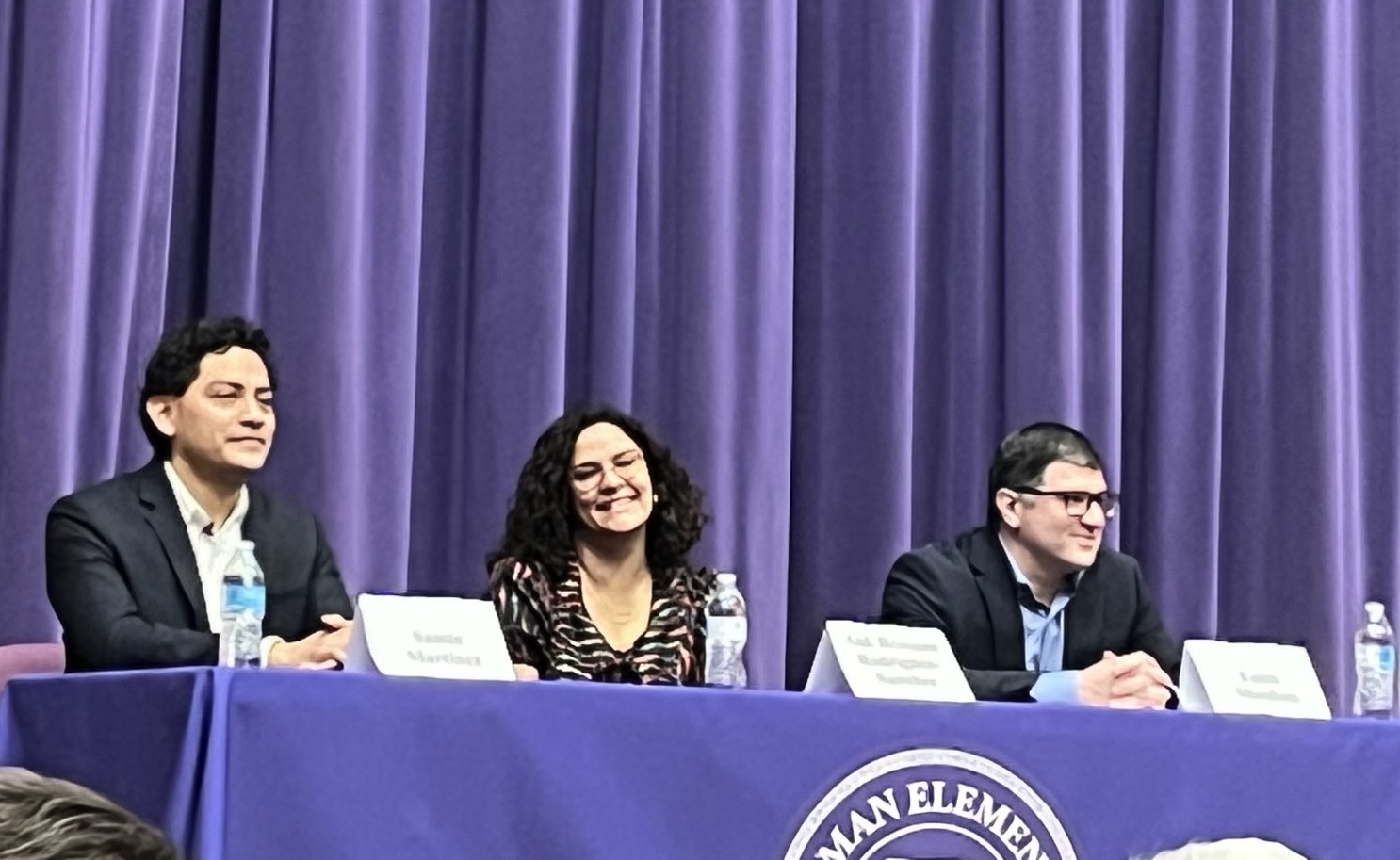
Samie, Rossana, and Laith at the Bateman Elementary debate
While George was busy advising MAT and helping to re-zone to allow them into the ward, Samie had to explain to angry residents that they hadn’t alerted the community because, “To be honest, there was a whole election that we had going on.” While he reassured residents that there was no risk from the asphalt plant, a city inspector report about MAT’s plant in the 12th Ward stated, “These odors are very uncomfortable to inhale and instantly made me nauseous. A citizen that was walking in the park expressed how horrible the odors were that day and how difficult it was for him to breathe.” We were able to capture this, and more of Samie’s history, in a website named Friends of Samie Martinez.
On the other hand, he was also endorsed by the hated Fraternal Order of Police (FOP) and supported by old-school machine bosses like Dick Mell and Iris Martinez. What he lacked in a coherent political program, he made up for with Machine connections and by showing up at random acts of crime, like some sort of political ambulance chaser. He hoped to ramp up people’s fears and anxieties and ride those fears into office.
While Rossana was the explicit leftwing candidate and Samie tried to walk the tightrope of being a “law-and-order progressive”, Laith attempted to take a middle position of being a “practical progressive”. In the process, he often echoed many of the positions that Rossana already held, giving voters little incentive to choose him over the progressive who already had the support of grassroots progressive organizations.
The Murder of Isidro Valverde
As election day neared, the 33rd ward was hit with a tragedy. On February 8, 21-year-old Isidro Valverde went to a neighborhood bar, became intoxicated, got into an argument with the security guard, pulled out his gun, but was de-escalated by the guard, and finally walked away. Later, police arrived and a bar patron pointed out that he was still nearby. Noticing this, he took off running. Police chased him into an alley where he was shot and killed while trying to stand up after tripping.
Rossana’s office put out a statement regarding the shooting and used the word “victim” to describe Valverde. Right-wing elements within the ward and online seized on this to manufacture fury over the idea that an alder would refer to someone killed by police as anything other than “criminal”. Samie embraced this fury and tried to use it to his advantage, piling on to it and posing as the law-and-order candidate.
On Valentine's Day, Rossana arrived at Isidro’s wake. She was there to comfort the grieving family and join the 150 mourners in attendance. Outside, there was a heavy-handed police presence. This was intimidation. A mourner stood outside, yelling at the police. His eyes were red with tears. One of Isidro’s cousins approached Rossana to thank her for humanizing her slain family member. Exactly two weeks away from Election Day, the wake was a brutal reminder of why she was in the race.
As the days went on, the right-wing fury increased and police tried to justify the murder by claiming Valverde shot at them first. The police Superintendent David Brown claimed that the body cam footage proved this. But when the footage was finally released, it proved that the police story was a lie.
With this revelation, Rossana demanded the resignation of Supt. Brown on February 16. It is difficult to imagine anyone else demonstrating such bold leadership while running for elected office and this is probably a first in US campaign history. The next day, she followed up by co-authoring an article about the need for “care, not cops” in The Nation magazine.
Every day, the police are allowed to get away with murder. Supt Brown himself had lied in 2021 to cover up a different police murder, as was detailed in the statement calling for his resignation. This is why we have to fight for a better world, even if it doesn’t seem possible. If we limit ourselves to what seems possible, we won’t find the courage to dream of the world we truly deserve.
Calling for the resignation of a police superintendent while running for election may seem impossible. But exactly one month later, March 16, Brown stepped down.
Chuy Endorses Samie Martinez
Samie’s campaign was largely unremarkable and could otherwise have been a mere footnote. But that changed when Chuy Garcia endorsed Samie on February, 18, ten days away from the election.
The irony of this was lost on no one. One of the most well-known progressives, who had been a key ally of Mayor Harold Washington, was now endorsing the candidate backed by one of Harold’s arch-nemeses: Dick Mell. But irony was not the problem. The problem was that Chuy was also a well-known figure among the 33rd Ward’s largely Latine population. His endorsement could mean the difference between Rossana winning outright in the first round, or dragging our all-volunteer team into an exhausting slugfest for the run-off.
It also meant we were no longer the only slate on the ballot. One of our key talking points on the doors was that we were offering more than an aldermanic candidate: we were offering a political vision that spanned the aldermanic and mayoral seats.
March to the Polls!
Elections are a form of “counting your strength”. Who can turn out the most canvassers? Who can get the most votes? A march is also a way to count your strength. How many marchers can you draw out in a show of solidarity?
With that in mind, we organized a “march to the polls” for February 25. In the style of a medieval military campaign, we created screen-printed banners with Rossana’s name, creating a colorful visual display.
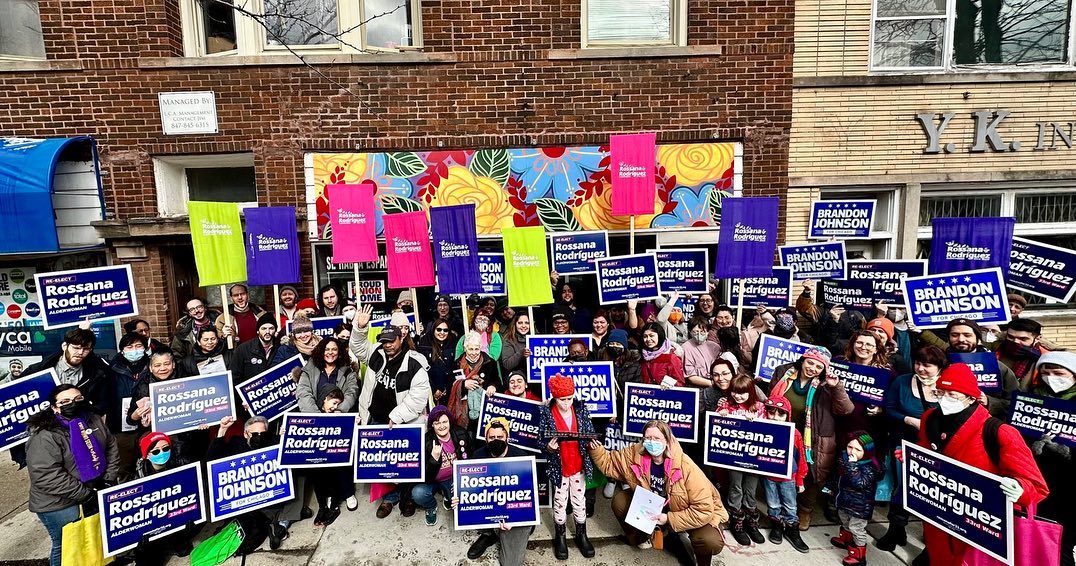
March to the polls group photo for Rossana 2023
On the heels of Rossana’s defiant stand against police murder, this would be our last show of strength before the election. It ended up a massive success, with so many attending that they barely fit in our office! Our photographer had to get up on a ladder to capture the full scale of our event.
We marched together to the early voting location at Kimball and Ainslie, then broke off for a final canvass.
February 28
Election Day would use the same “chain of command” system that we developed for Rossana’s first campaign. I spent the day at my precinct’s polling place, Patrick Henry Elementary. At one point, a young person came to vote and as they approached the entrance they angrily grabbed every Paul Vallas yard sign along the way, bent them up, and crammed them into a garbage can before voting. After voting, they came out of the polling place and calmly walked away.
Hilariously, the Vallas supporters who had been handing out literature did not know what to do and called the police, as if this was a violent crime. The police eventually showed up. As expected, there was nothing for them to do except take notes. They stayed at the polling place for a while, at which point I decided to go knock on some doors to help turn out the vote.
When the polls closed, Rossana supporters gathered at Noon O Kabab to await the results. Those of us in the know were tense, with the trauma of the 2019 run-off still haunting us. Would our all-volunteer team have the energy to canvass hard for another month against Samie? The mayoral race was important to us. But the aldermanic seat was an existential question.
As the results came in, it became clear that we could shake off the stigma from 2019. In a three-way race, Rossana won with a solid 54% of the vote.
33rd Ward Aldermanic Breakdown
- Rossana - 5,814 votes - 54.69%
- Samie - 3,604 votes - 33.9%
- Laith - 1,212 votes - 11.4%
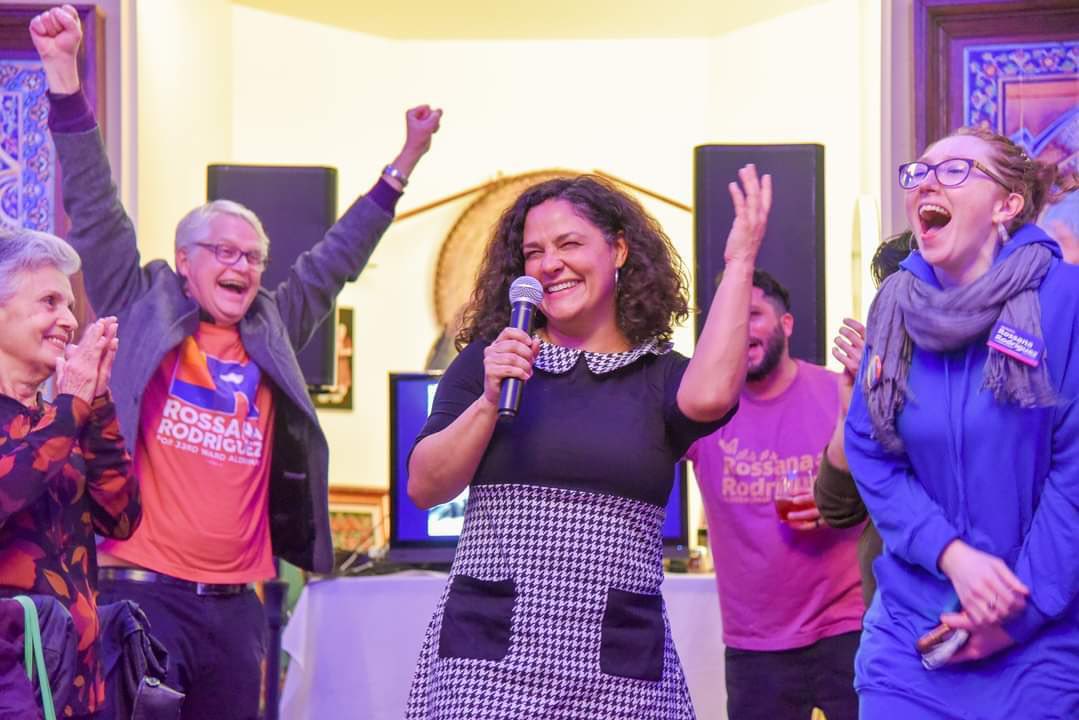
Rossana flanked by supporters as she announces her 2023 victory
Rossana’s campaign had explicitly run to the left. It avoided moving to the center. Her campaign went so far as to demand the resignation of the police superintendent two weeks away from the election in defense of someone murdered by police! The “common sense” was that she should have lost for being “too radical”. Instead, she won a three-way race with more than half of the vote. On top of that, we had succeeded thanks to all of our hard work in the years before the election and despite the fact that lots of money and volunteers were diverted elsewhere for the mayor’s race.
Two elections in a row, she was painted by her opposition as being the “crime candidate”. Two elections in a row, she was able to communicate and demonstrate what it meant to stand by the politics that public safety is about public health, this time with TNT as her concrete example.
It quickly became clear that running to the left also worked for Brandon. The polarized candidates in the mayor's race were Brandon and Paul. Sure enough, candidates trying to occupy the centrist positions between them failed.
This was shaping up as the perfect contrast. Brandon vs Paul, teachers vs cops, CTU vs FOP. This would be an election to remember!
Mayoral breakdown
- Paul - 185,743 votes - 32.90%
- Brandon - 122,093 votes - 21.63%
- Lori - 94,890 votes - 16.81%
- Chuy - 77,222 votes - 13.68%
Chuy tried to strike a balance between his progressive credentials and support for the police. In doing so, he finished in fourth place, behind the much-despised incumbent. The candidates that embraced the political polarization and did their best to embody it were the ones that resonated with voters. It is important to note that, once this became a run-off between Brandon and Paul, Chuy endorsed Brandon. Chuy recognized the gravity of the moment and made sure to lend his considerable support to the left-wing candidate.
Energized by the fact that Rossana had won a decisive, first-round victory and that our mayoral candidate had made it to the run-off, 33WF was ready to hit some doors! … After declaring a one-week vacation.
Bernie Sanders
In sharp contrast to New York City, a bastion of liberalism that had elected a former cop to be mayor, Chicago now had the opportunity to take a former teacher and union organizer into the mayor’s office.
Our political ecosystem had even managed to capture the attention of the nation. This was confirmed when the impossible happened: Bernie Sanders endorsed Brandon Johnson. This led to a March 30th Sanders rally at UIC’s Credit Union Arena.
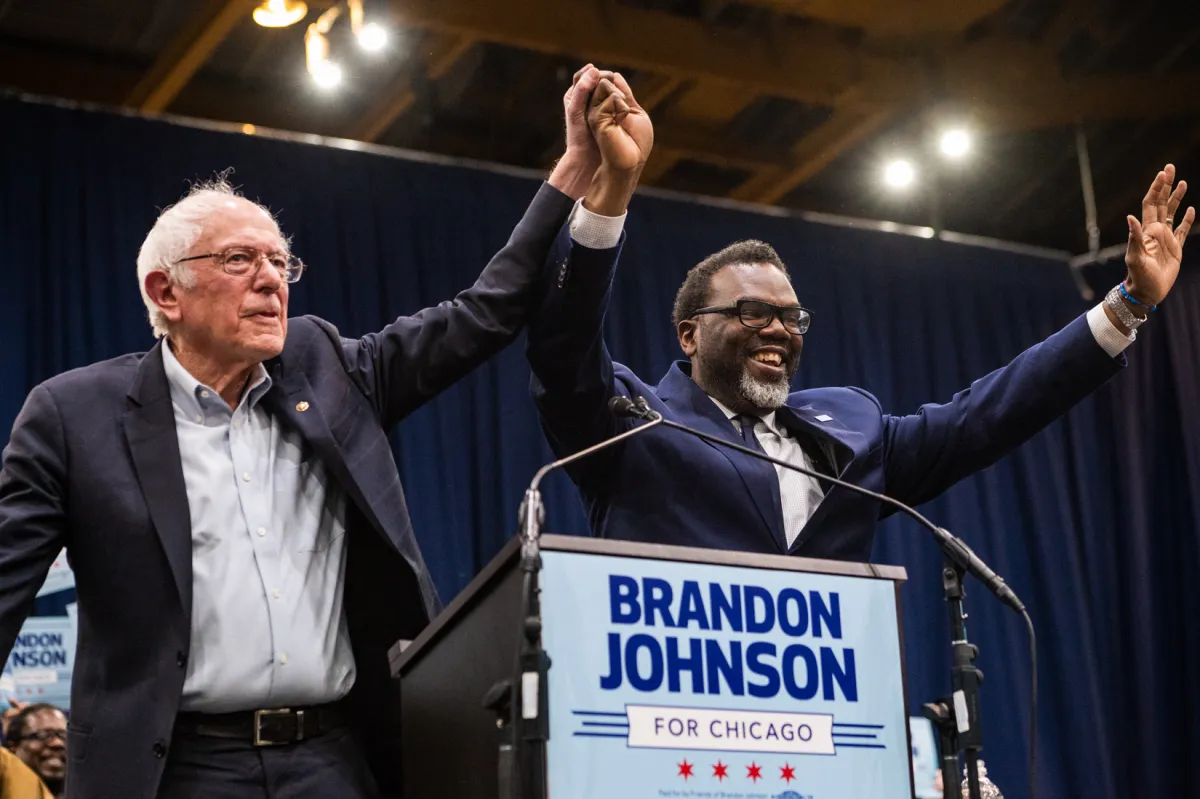
Bernie Sanders and Brandon Johnson at UIC
While this endorsement probably didn’t sway many voters, it did re-energize an exhausted volunteer base and likely attracted new volunteers who had been die-hard Bernie supporters for his two previous presidential runs. Chicago’s political ecosystem had been huge Bernie fans, and having “Tio Bernie” rallying for Brandon gave our campaign the political and moral boost we needed to ride into April 4.
We had earned the attention of the nation and even Bernie was on our side.
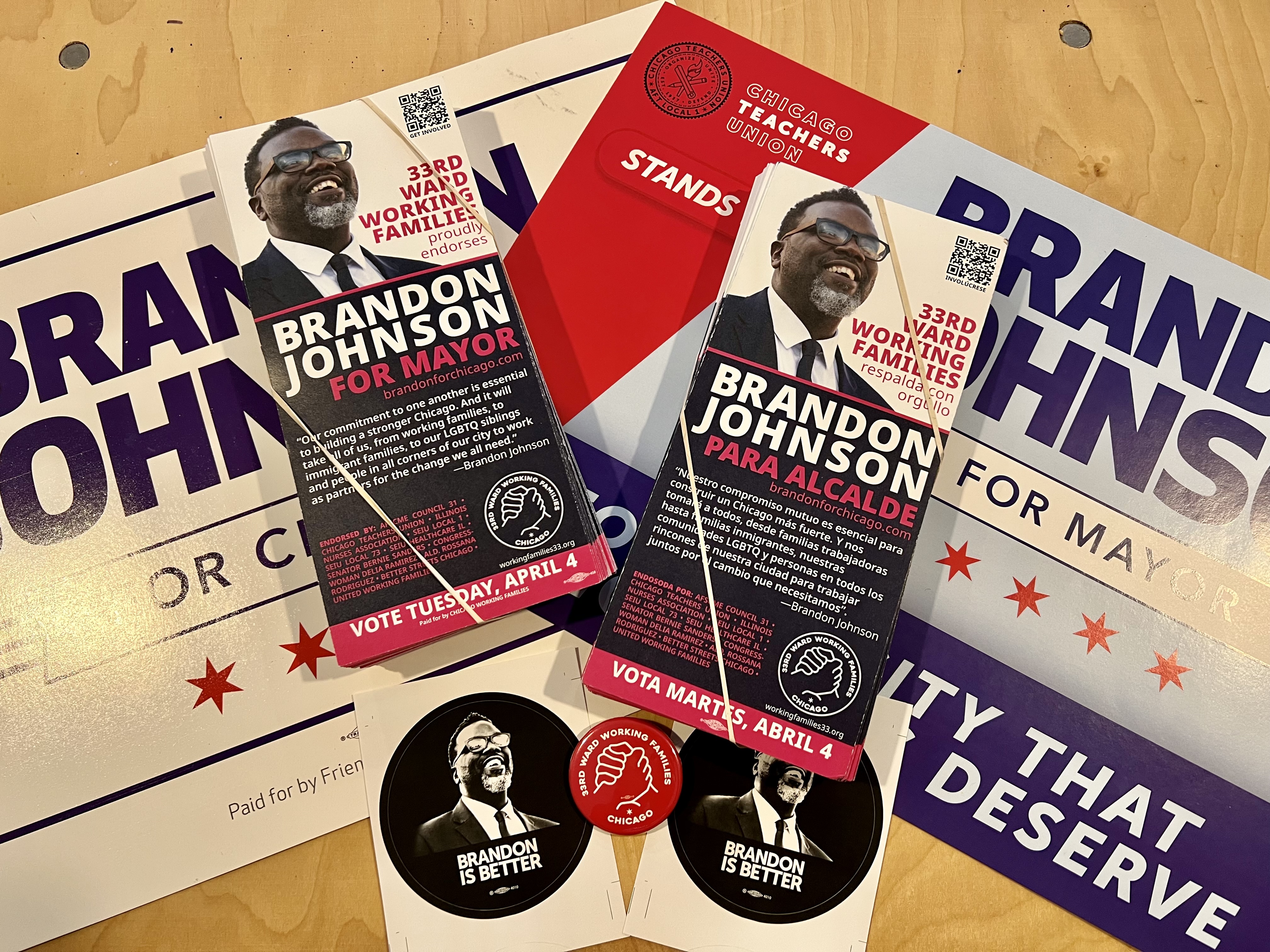
33WF literature for Brandon run-off
April 4
At that point in the campaign, everything was a blur. All that was left was to drive hard for Brandon and flip any remaining voters who might be on their way to the polls, but still on the fence about who to vote for. We all returned to our chain of command and I resumed my post at Patrick Henry Elementary for the day, while breaking to knock doors to get out the vote.
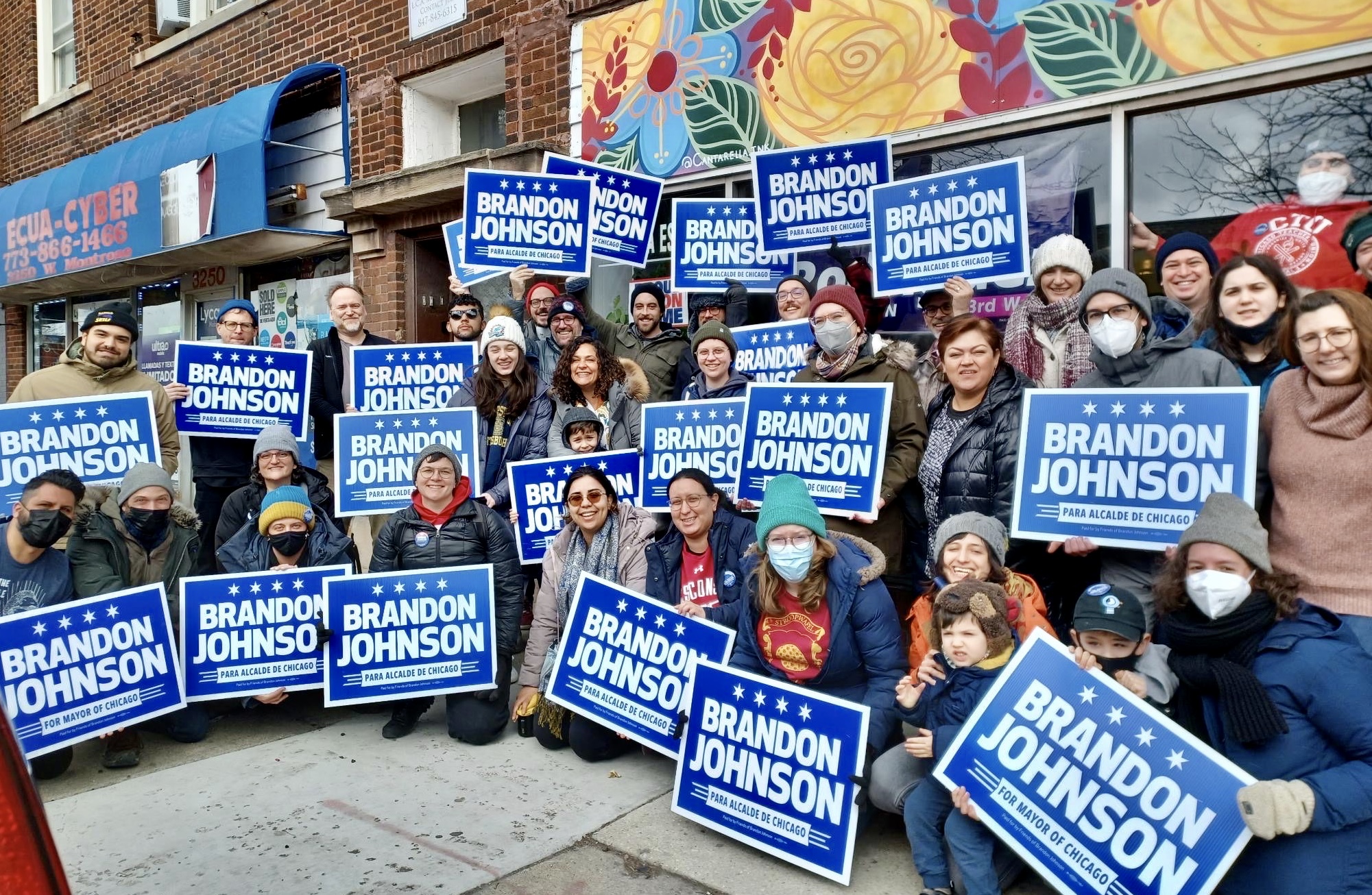
33WF runoff canvass for Brandon 2023
When the polls closed, we re-grouped at the 33WF office. As the results were pouring in, it quickly became clear that Brandon had won!
Mayoral Run-off
- Brandon Johnson - 319,481 votes - 52.16%
- Paul Vallas - 293,033 votes - 47.84%
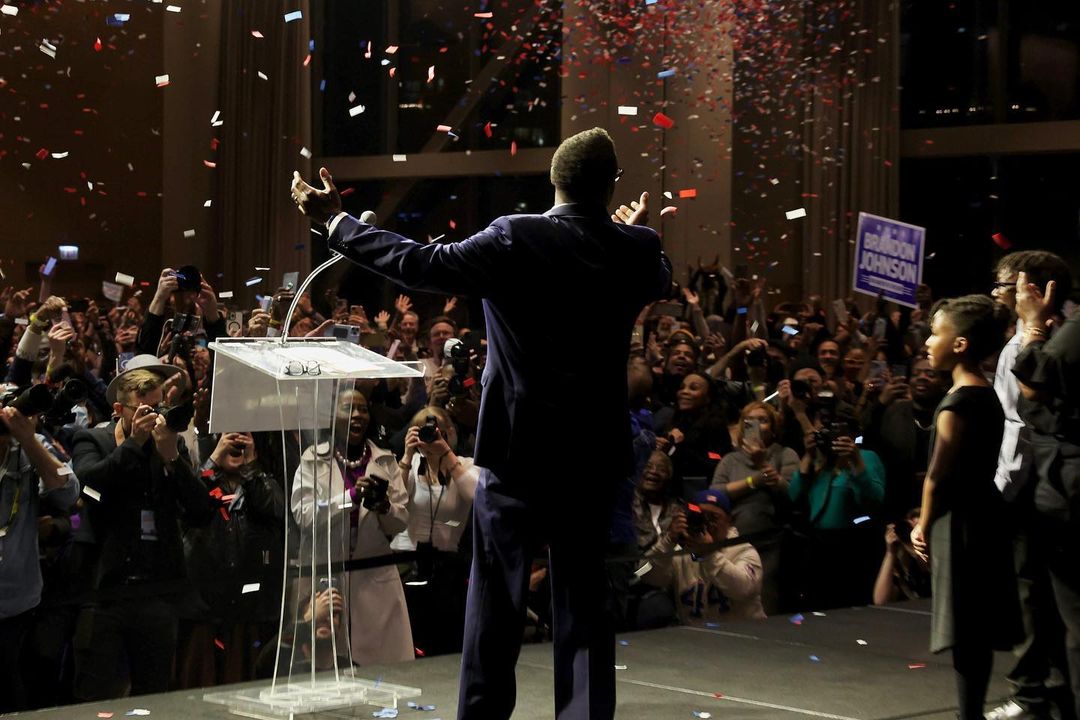
Brandon celebrates his victory
Takeaways
Throughout this overview of 13 months, we’ve tried to mix the analysis into the story. But a few takeaways needed more space to flesh out. Below we’ll try to highlight some lessons.
Protest Movements and Politicians Reinforce Each Other
The George Floyd protests inspired Rossana to seek public safety alternatives to the police.
By co-authoring and championing TNT, she translated the movement on the streets into legislation. This legislation gave organizers who had been on the streets protesting something to knock doors for and continue organizing.
The success of doorknocking for the TNT referendum then legitimized a platform point for Rossana and Brandon to run on. This allowed them to offer concrete ways to counter law-and-order candidates while continuing to legitimize the spirit of the Uprising, and win their races.
We Can Beat the Backlash
We did not face the same electoral results as Buffalo or NYC. This wasn't simply about having protests during the uprising or having politicians that championed #TreatmentNotTrauma. It was about having a political ecosystem that takes elections seriously from a left-wing perspective. This seriousness is made concrete in the growth and spread of ward organizations that prioritize electoral work, while organizing during and between elections.
Deliberately adding this electoral component to Chicago's ecosystem allowed us to organically mobilize for the 2023 election and set the baseline terms of what we expected from our candidates. Regardless of what Brandon may or may not have personally wanted to do, it was clear that shifting too far to the center on police would cost him an army of volunteers because these were not atomized people. Instead, we were battle-tested and committed members of organizations that were transformed by the 2020 Uprising.
Having this kind of experienced and serious ecosystem allowed us to not only defend politicians like Rossana from the backlash and get them re-elected, but it even allowed us to advance by getting Brandon into the mayor's office. Otherwise, Vallas would have been Chicago's answer to Eric Adams. The success of the backlash is not inevitable.
Centrism Doesn’t Win
In the 33rd Ward, the centrist candidate was Laith Shabaan. Among the four main mayoral contenders, the centrist was Chuy. In both cases, they came in last.
The “common sense” of electoral politics is that a candidate should not be too far to the left or the right. But in the 2016 presidential election, the two most electrifying candidates were Bernie Sanders and Donald Trump, representing the extreme left and right, respectively. With the Democrats unwilling to embrace Bernie, they lost to Trump.
In Rossana’s 2019 election, she went up against Deb Mell and Katie Sieracki. In that race, Deb was the law-and-order candidate and Katie was the centrist. If centrism was a winning strategy, Katie would have won. Instead, she came in last.
Politics is about a lot of things and one of them is polarization, which means you need to pick a lane and stick with it because the center will crumble. You can’t build a platform on a crumbling foundation. As of this writing, Kamala Harris has proven this again by embracing Dick Cheney over Bernie Sanders and losing to Trump.
To put it another way, you can't be everyone's candidate on campaign nor everyone's politician when in office.
Political Ecosystems Have Power
As far as the average voter was concerned, Chuy was the obvious progressive candidate. As noted by Greg Pratt, this was why Lori focused all of her firepower on Chuy until it was too late.
Due to his background as a CTU organizer and Dyett hunger striker, and his explicit support for TNT, Chicago organizers felt excited to volunteer for his campaign. When you give people a political crusade, they can do marvelous things, pushing beyond the boundaries of “the possible”. Chicago’s unions, ward organizations, and other progressive groups came together to build a ground game that took Brandon from less than 3% name recognition to mayor of the 3rd largest city in the country. In effect, our ecosystem came together in 2023 to act like a temporary political party.
While some might argue that Lori pulled off the same victory in 2019, the reality is that her power was not in a ground game. Much like Trump in 2016, she relied on positioning herself as an outsider, above the scandals and corruption of the old-guard Chicago Machine. While she was able to coast to victory on passive anger, Brandon was carried to victory on the enthusiasm and hope of a volunteer army.
This is important to remember because if Chicago’s political ecosystem could win a mayoral office when we work together… then what else are we capable of achieving when we unite? And if we carried Brandon to victory, what does he owe us now that he is in office? As of this writing, these are two questions that we are all still wrestling with.
Winning Isn’t Everything
Out of the 21 socialist and progressive aldermanic candidates, only 10 won – the original 6 were re-elected with the addition of Angela Clay, Desmon Yancy, Julia Ramirez, and Jessie Fuentes. There is no way to sugar-coat how disappointing this was.
In the absence of infrastructure to support all 21, most of these races were won by the incumbents or incumbent-supported candidates. Nevertheless, many of these races were still important to contest. Remember that 33WF was born out of an aldermanic campaign that lost in 2015. Winning is important, but it isn’t everything. What is most important is the determination to pick a fight and see who it inspires to join in.
People are continuing to organize in the 10th, 15th, 30th, 39th, 48th, and 50th wards to create ward organizations that can be prepared for the future. More so than any election victory, this should give us hope.
Two Types of Socialist
There was a curious division between socialists regarding the mayoral race. Brandon had the support of Chicago’s socialist politicians like Rossana, Carlos, and Byron. He had socialists and abolitionists canvassing for him all over the city, such as myself. He even had Democratic Socialist Godfather Bernie Sanders! But not a single socialist organization endorsed him. Until the impossible happened and Brandon made the run-off, most socialist organizations barely discussed him.
While there were legitimate reasons to be skeptical of Brandon as an individual, or the the mayor’s office as an institution, there seemed to be something else at play: a gulf between socialists who spent most of their time exclusively among socialists, and socialists who spent most of their time embedded in other parts of the ecosystem and therefore had a better read of the moment.
The mayoral race was not just about beating Paul Vallas. It was also not just about holding hope in another career politician. Brandon had been a teacher. He had been a CTU organizer. He had been an active and visible part of UWF. He came up from our political ecosystem and represented a proto-Labor candidate being backed by the ecosystem he helped nurture. Campaigning for Brandon was about seeing if we could take one of our own organizers, with 3% name recognition, and place them in the mayor’s office of the 3rd largest city in the country. This was about pushing the limits of what our ecosystem could accomplish when we worked together while also beating the Vallas boogeyman. It wasn’t possible to understand this if you were the sort of socialist who kept the rest of the ecosystem at arm's length or if politics was just ideas divorced from the material world.
What does this mean for the future of the socialist/abolitionist movement in Chicago? What kind of organization do we need to build to concentrate the “rooted socialists” and pull in the isolated ones, and fight for socialist positions within the political ecosystem without estranging ourselves from it?
Careful What You Wish For
As of this writing, it is clear that our political ecosystem has struggled to find its footing. 33WF's Simon Swartzman has written an excellent balance sheet of Brandon's first year in Against the Current. Brandon’s administration has been a mixed bag and proving to create obstacles, which we will dive deeper into in an upcoming brief history of the Rossana/Graciela campaign of 2024.
With the next mayoral election only two years away, this raises several questions. What can our ecosystem do to salvage the situation? What would it look like to take our existing ecosystem and forge it into a political party that could provide direction? Is this a situation worth salvaging or would it be better to refocus our attention elsewhere? What other sort of infrastructure do we need to better navigate these “mixed bags” and remind ourselves that whether or not someone is “our person in office”, they are still a politician and need to be challenged critically?
Conclusion
Elections are one field of struggle among many others. No field of struggle is inherently more important than another. Like any field of struggle, whether it is protests, elections, or mutual aid, the main question is: what will organizers do with it?
In Chicago, we’ve taken elections seriously and formed a unique political ecosystem because of that. We have ward organizations that can behave like beachheads of struggle both during and between elections. Our ward organizations provide central locations for unions and other groups to anchor their work, in addition to the ward groups themselves.
Our experiments in elections have demonstrated that we can make advances in the face of a backlash, centrism is a losing strategy, and sticking to left-wing principles will help mobilize volunteers rather than scare away voters. We’ve demonstrated that leaning into abolitionist frameworks can work for legislation, referenda, and even for winning offices. No other city has as many open socialists in city council as we do. No other city has managed to unite that ecosystem to put a former teacher and labor organizer in the mayor’s seat. But our experiments are not over and we still have a lot to learn as we reach new plateaus and those plateaus present new problems.
Remembering our history and how we got here can help organizers in Chicago and beyond chart our paths forward to greater reforms and revolution.
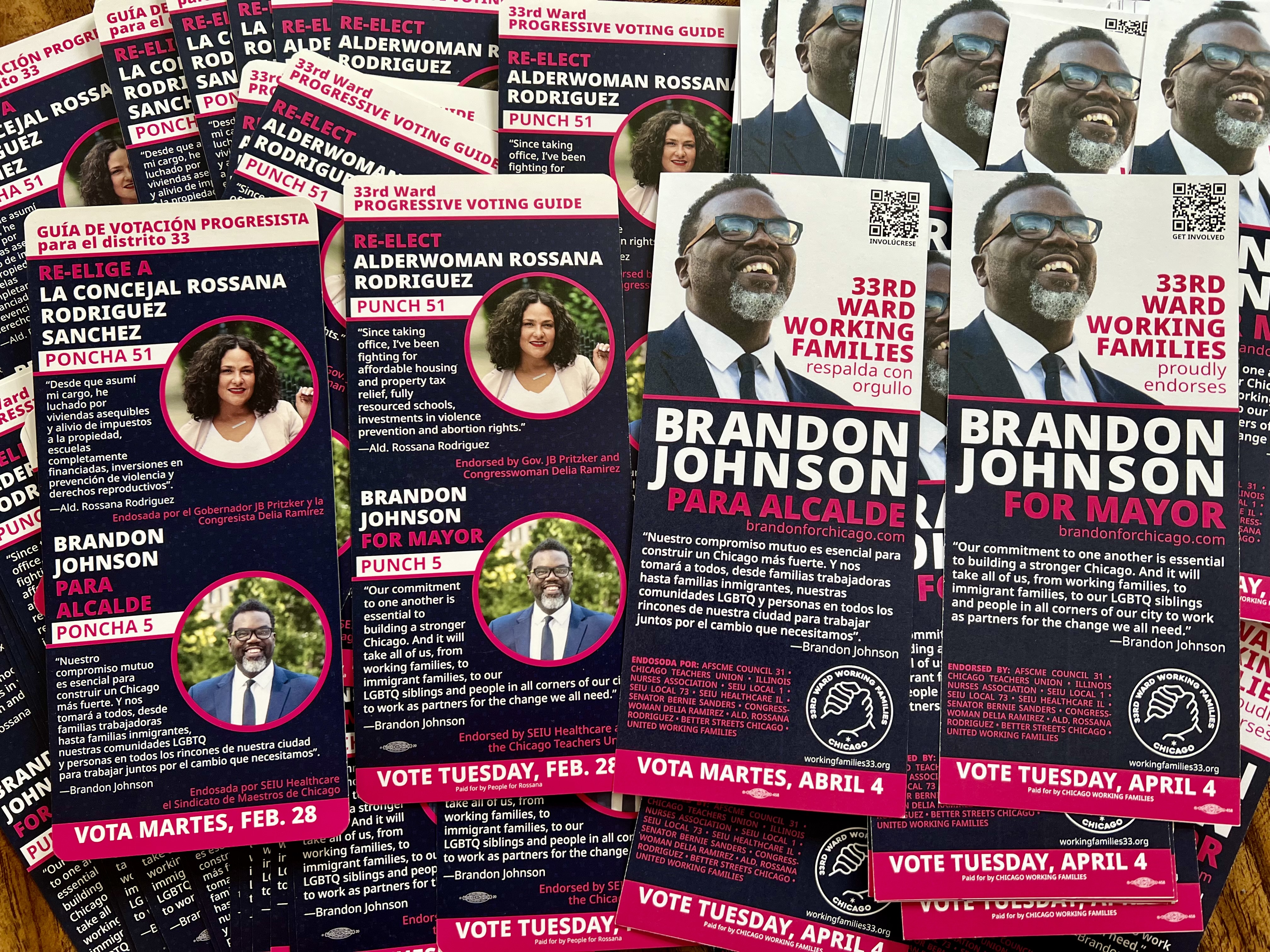
Palmcards for Rossana and Brandon in 2023
Updated 02/23/25: Adds "takeaways" section on beating the backlash. Works it into conclusion.
Updated 03/04/25: Minor grammatical fixes across the article. Adds the campaign video.
Updated 03/21/25: Refactor of "We Can Beat the Backlash" for clarity.